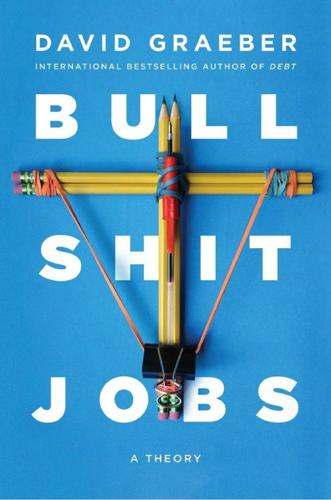
Bullshit Jobs: A Theory
by
David Graeber
Published 14 May 2018
Contents Preface: On the Phenomenon of Bullshit Jobs Chapter 1 What Is a Bullshit Job? Why a Mafia Hit Man Is Not a Good Example of a Bullshit Job | On the Importance of the Subjective Element, and Also, Why It Can Be Assumed That Those Who Believe They Have Bullshit Jobs Are Generally Correct | On the Common Misconception That Bullshit Jobs Are Confined Largely to the Public Sector | Why Hairdressers Are a Poor Example of a Bullshit Job | On the Difference Between Partly Bullshit Jobs, Mostly Bullshit Jobs, and Purely and Entirely Bullshit Jobs Chapter 2 What Sorts of Bullshit Jobs Are There? The Five Major Varieties of Bullshit Jobs | 1.
…
The Five Major Varieties of Bullshit Jobs | 1. What Flunkies Do | 2. What Goons Do | 3. What Duct Tapers Do | 4. What Box Tickers Do | 5. What Taskmasters Do | On Complex Multiform Bullshit Jobs | A Word on Second-Order Bullshit Jobs | A Final Note, with a Brief Return to the Question: Is It Possible to Have a Bullshit Job and Not Know It? Chapter 3 Why Do Those in Bullshit Jobs Regularly Report Themselves Unhappy? (On Spiritual Violence, Part 1) About One Young Man Apparently Handed a Sinecure Who Nonetheless Found Himself Unable to Handle the Situation | Concerning the Experience of Falseness and Purposelessness at the Core of Bullshit Jobs, and the Importance Now Felt of Conveying the Experience of Falseness and Purposelessness to Youth | Why Many of Our Fundamental Assumptions on Human Motivation Appear to Be Incorrect | A Brief Excursus on the History of Make-Work, and Particularly of the Concept of Buying Other People’s Time | Concerning the Clash Between the Morality of Time and Natural Work Rhythms, and the Resentment It Creates Chapter 4 What Is It Like to Have a Bullshit Job?
…
(On Spiritual Violence, Part 2) Why Having a Bullshit Job Is Not Always Necessarily That Bad | On the Misery of Ambiguity and Forced Pretense | On the Misery of Not Being a Cause | On the Misery of Not Feeling Entitled to One’s Misery | On the Misery of Knowing That One Is Doing Harm | Coda: On the Effects of Bullshit Jobs on Human Creativity, and On Why Attempts to Assert Oneself Creatively or Politically Against Pointless Employment Might Be Considered a Form of Spiritual Warfare Chapter 5 Why Are Bullshit Jobs Proliferating? A Brief Excursus on Causality and the Nature of Sociological Explanation | Sundry Notes on the Role of Government in Creating and Maintaining Bullshit Jobs | Concerning Some False Explanations for the Rise of Bullshit Jobs | Why the Financial Industry Might Be Considered a Paradigm for Bullshit Job Creation | On Some Ways in Which the Current Form of Managerial Feudalism Resembles Classical Feudalism, and Other Ways in Which It Does Not | How Managerial Feudalism Manifests Itself in the Creative Industries through an Endless Multiplication of Intermediary Executive Ranks | Conclusion, with a Brief Return to the Question of Three Levels of Causation Chapter 6 Why Do We as a Society Not Object to the Growth of Pointless Employment?
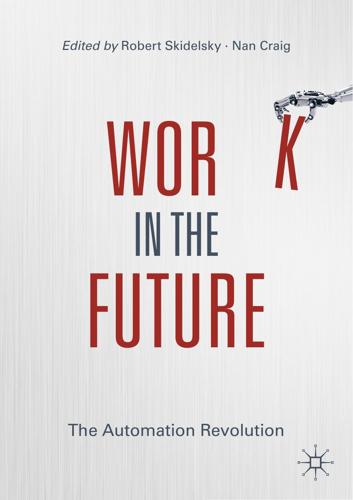
Work in the Future The Automation Revolution-Palgrave MacMillan (2019)
by
Robert Skidelsky Nan Craig
Published 15 Mar 2020
Retrieved August 2, 2019, from https://yougov.co.uk/topics/lifestyle/articles-reports/2015/08/12/british-jobs-meaningless Graeber, D. (2004). Fragments of an Anarchist Anthropology. Chicago: Prickly Paradigm Press. Graeber, D. (2013). On the Phenomenon of Bullshit Jobs: A Work Rant. Strike! Magazine. Retrieved August 2, 2019, from https://strikemag.org/ bullshit-jobs/ Graeber, D. (2018). Bullshit Jobs. London: Allen Lane. Keynes, J. M. (1930). Economic Possibilities for Our Grandchildren (1930). In Essays in Persuasion. New York: Harcourt Brace. Sahlins, M. (1972/2017). Stone Age Economics. Reprint. Abingdon, Oxon and New York: Routledge Classics.
…
Many people fall into a line of work that eventually begins to intrigue and fulfil them, and sometimes even unpleasant work can be made more meaningful by a commitment to doing it well. It is pointless, though, to insist that people should be able to find meaning arbitrarily in their work, whether it’s useful or not. Depressingly, as David Graeber argues in Bullshit Jobs, a lot of work doesn’t really demand to be done at all.5 If we agree that a sense of responsibility—a sense that the work demands that you do it—is a defining feature of work, then a bullshit job isn’t properly work at all. 5 Graeber (2018). 8 Work as an Obligation 77 In this sense, work is clearly relational; it implies a relationship to or with something, whether that something is another person, an organisation, or reflexively with oneself.
…
And the logic that starts in the financial sector slowly becomes the norm and extends everywhere. It definitely extends to universities. This is my riposte, incidentally, to The Economist who wrote a reply to the original Bullshit Jobs article almost instantly after I wrote it. They tried to make the argument that this endless creation of new office jobs is actually necessary—it’s all because with complex global supply chains, production has become so digitized and efficient that we need many times more people to manage it. So bullshit jobs they claimed were the equivalent of the boring alienating factory job of the 1940s or 1950s, but they are also equally necessary. Our wealth depends on them.
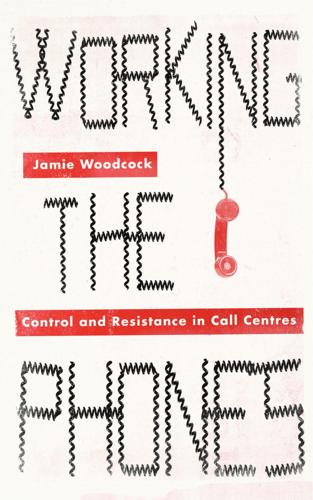
Working the Phones: Control and Resistance in Call Centres
by
Jamie Woodcock
Published 20 Nov 2016
Mario Tronti, ‘The Strategy of Refusal’, Operai e capitale (Turin: Einaudi, 1966), available at: http://libcom.org/library/strategyrefusal-mario-tronti Michael Hardt and Antonio Negri, Empire (London: Harvard University Press, 2001), p. 204. David Graeber, ‘On the Phenomenon of Bullshit Jobs’, Strike Magazine, 17 August 2013, http://strikemag.org/bullshit-jobs Ibid. Braverman, Labor and Monopoly Capital (1999). Graeber, ‘On the Phenomenon of Bullshit Jobs’ (2013). 177 Working the Phones chapter 5 1. Robert Blackburn, Union Character and Social Class (London: Batsford, 1967), p. 18. 2. Beynon, Working for Ford (1973), p. 140. 3. Phil Taylor and Peter Bain, ‘Trade Unions, Workers’ Rights and the Frontier of Control in UK Call Centres’, Economic and Industrial Democracy, Vol. 22, No. 1 (2001), p. 62. 4.
…
Glucksmann, M. (2004) ‘Call Configurations: Varieties of Call Centre and Divisions of Labour’, Work, Employment & Society, Vol. 18, No. 4, pp. 795–811. Goodrich, C. L. (1975) The Frontier of Control: A Study in British Workshop Politics, London: Pluto Press. Graeber, D. (2013) ‘On the Phenomenon of Bullshit Jobs’, Strike Magazine, 17 August, available at: http://strikemag.org/bullshit-jobs Haider, A. and Mohandesi, S. (2013) ‘Workers’ Inquiry: A Genealogy’, Viewpoint Magazine, Vol. 3, available at: http://viewpointmag.com/ 2013/09/27/workers-inquiry-a-genealogy Hardt, M. and Negri, A. (2001) Empire, London: Harvard University Press. 186 References Harper, E.
…
David Graeber notes that Keynes predicted in 1930 that by the end of the century the working week would be reduced to 15 hours.48 Not only did this fail to materialise, but the opposite now seems to be true. The potential of technology has instead been exploited to make people work even more. In the place of declining manufacturing jobs there has been an increase in what David Graeber calls ‘bullshit jobs’. These jobs are far removed from any fulfilling activity, so much so that many people find it difficult to explain what they are actually employed to do. This has implications for workplace struggle: what demands could or would be raised in this context? Although assembly-line work is repetitive and undoubtedly unappealing, the application of technology can vastly reduce the amount of labour required and machinery can be put to work for a variety of different ends.
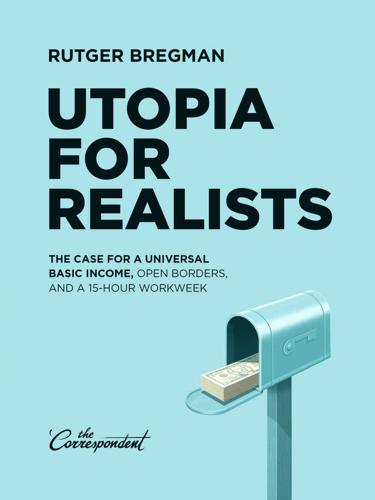
Utopia for Realists: The Case for a Universal Basic Income, Open Borders, and a 15-Hour Workweek
by
Rutger Bregman
Published 13 Sep 2014
A few years ago he wrote a fascinating piece that pinned the blame not on the stuff we buy but on the work we do. It is titled, aptly, “On the Phenomenon of Bullshit Jobs.” In Graeber’s analysis, innumerable people spend their entire working lives doing jobs they consider to be pointless, jobs like telemarketer, HR manager, social media strategist, PR advisor, and a whole host of administrative positions at hospitals, universities, and government offices. “Bullshit jobs,” Graeber calls them. They’re the jobs that even the people doing them admit are, in essence, superfluous. When I first wrote an article about this phenomenon, it unleashed a small flood of confessions.
…
Deborah Padfield, “Through the eyes of a benefits adviser: a plea for a basic income,” Open Democracy (October 5, 2011). http://www.opendemocracy.net/ourkingdom/deborah-padfield/through-eyes-of-benefits-adviser-plea-for-basic-income 38. David Graeber, “On The Phenomenon of Bullshit Jobs,” Strike! Magazine (August 17, 2013). http://www.strikemag.org/bullshit-job 7 Why It Doesn’t Pay to Be a Banker 1. This reconstruction of the strike is based on contemporary coverage in The New York Times. 2. Though officially there were only 12,281 lobbyists registered in Washington in 2014, this misrepresents the situation since an increasing share of lobbyists operates underground.
…
This is just as true for your former feudal landowner as it is for the current CEO of Goldman Sachs. The only difference is that bankers sometimes have a momentary lapse and imagine themselves the great creators of all this wealth. The lord who was proud to live off his peasants’ labor suffered no such delusions. Bullshit Jobs And to think that things could have been so different. Remember how the economist John Maynard Keynes predicted we’d all be working just 15 hours a week by 2030?12 That our prosperity would shoot through the roof and we’d exchange a sizable chunk of our wealth for leisure time? In reality, that’s not at all what has happened.

Having and Being Had
by
Eula Biss
Published 15 Jan 2020
Roughly a third of all jobs, David Graeber estimates, are what he calls “bullshit jobs.” These jobs are so pointless that even the people doing the jobs don’t see any reason for them to exist. Bullshit jobs aren’t shit jobs, the distinction being that shit jobs involve essential work that needs to be done—what makes them shit is that the workers who do these jobs are badly treated, undervalued, and poorly paid. “Shit jobs tend to be blue collar and pay by the hour,” Graeber observes, “whereas bullshit jobs tend to be white collar and salaried.” Bullshit jobs are not usually dangerous or physically demanding. And they pay well.
…
And they pay well. But they don’t offer any of the rewards of service or the satisfaction of having done something worthwhile. Many of them involve doing nothing at all. Where shit jobs often expose a worker’s body to harm, bullshit jobs cause psychological harm. “Daily meaning as well as daily bread,” Terkel writes, is what people are looking for in work, “a sort of life rather than a Monday through Friday sort of dying.” Among the people Terkel interviews, the farmer and the flight attendant and the prostitute and the stockbroker, there are some who take deep pleasure in their work—the stonemason, the piano tuner, the bookbinder, the carpenter who is also a poet.
…
Guthrie, The Emily Dickinson Journal, Fall 2000. MASTERED The Gift: Creativity and the Artist in the Modern World, Lewis Hyde. Vintage, 2007. First published 1983. “On the Origins of the Northern European Notion of Paid Labor as Necessary to the Full Formation of an Adult Human Being,” David Graeber. Bullshit Jobs: A Theory. Simon & Schuster, 2018. Mrs. Woolf and the Servants, Alison Light. Bloomsbury, 2008. Light writes, “When I first had the idea for this book a dozen or so years ago, I found it hard to think of domestic service except as exploitation, a species of psychological and emotional slavery—‘dependency,’ with its pejorative overtones, would be a more appropriate term.”
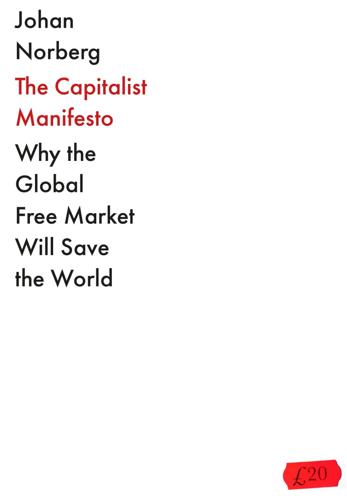
The Capitalist Manifesto
by
Johan Norberg
Published 14 Jun 2023
But the interesting thing is this: if you have time to play and email during working hours, or can surf porn 75 per cent of the time without it being noticed on your performance like a particular Aviation Authority employee (one of Paulsen’s favourite examples), at least it is an indication that the demands and pace of working life generally can’t have been pushed up to inhuman levels. In his book on ‘bullshit jobs’, Graeber makes much of the fact that 37 per cent of Britons say no when asked whether their work ‘makes a meaningful contribution to humanity’. By equating this with the claim that these 37 per cent are ‘convinced their jobs are meaningless’, he concludes that the thesis that there are more and more bullshit jobs has ‘been overwhelmingly confirmed by statistical research’.27 Yet the question he asked presents a pretty high threshold for not getting your job declared idiotic.
…
All the ten thousand people you can thank for your cup of coffee certainly do not go to work with joy. Some do it just to survive; others do it because the alternatives are terrible. Many probably hate their jobs. Wherever we work, we also have Monday mornings when we curse the toil and think we have ‘bullshit jobs’. Work is not always fun – that’s why we pay each other to do it! In free capitalism we go to work not because someone has forced us there but because we need the money and have decided that this is a better way of getting it than the alternatives. And that’s a pretty new phenomenon in history.
…
This feels wrong because our social psychology and our economic debate is often characterized by a picture-book nostalgia. It seems that we have lost ‘real jobs’ where ‘real men’ produced things you could drop on your foot – the kind of jobs that are in children’s picture books. In exchange we get a lot of unsatisfactory bullshit jobs (as David Graeber called them in a popular book of the same name) with temporary contracts where it’s unclear what is actually produced. Which children’s books are really about art directors, personal trainers, PR consultants, content managers, food couriers or biotechnological analysts? The picture books should be supplemented with the views of people who have actually worked in those fabled factories.
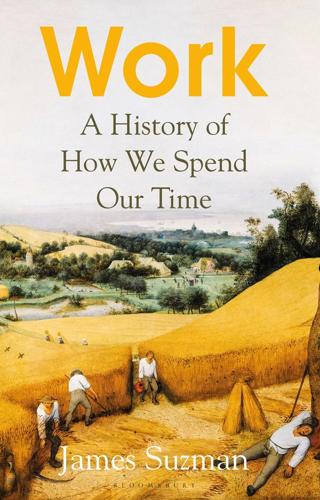
Work: A History of How We Spend Our Time
by
James Suzman
Published 2 Sep 2020
Oates, Workaholics, Make Laziness Work for You, Doubleday, New York, 1978. 12Leigh Shaw-Taylor et al., ‘The Occupational Structure of England, c.1710–1871’, Occupations Project Paper 22, Cambridge Group for the History of Population and Social Structure, 2010. 13Colin Clark, The Conditions of Economic Progress, Macmillan, London, 1940, p. 7. 14Ibid., p. 17. 15https://www.strike.coop/bullshit-jobs/. 16David Graeber, Bullshit Jobs: A Theory, Penguin, Kindle Edition, 2018, p. 3. 17https://www.strike.coop/bullshit-jobs/. 18The Economist, 19 November 1955. 19Trends in College Pricing, Trends in Higher Education Series, College Board, 2018, p. 27, https://research.collegeboard.org/pdf/trends-college-pricing-2018-full-report.pdf. 20California State University Statistical Abstract 2008–2009, http://www.calstate.edu/AS/stat_abstract/stat0809/index.shtml.
…
This latter category of jobs, which he argues includes corporate lawyers, public relations executives, health and academic administrators and financial service providers, he referred to as ‘bullshit jobs’ and defined as forms ‘of employment that is so completely pointless, unnecessary, or pernicious that even the employee cannot justify its existence’. ‘It’s as if someone were out there making up pointless jobs just for the sake of keeping us all working,’ he argued. For each person in a role which they may think of as a bullshit job, there are of course others in near identical roles who nevertheless find satisfaction, purpose and fulfilment in them. Even so, the fact that workplace surveys consistently find more people are dissatisfied with the work they do, suggests that this is often just a coping mechanism – a characteristic of a species whose evolutionary history has been shaped so profoundly by its need for purpose and meaning.
…
In a brief essay he wrote in 2013, which subsequently went viral and later formed the basis of a book, he differentiated between jobs that were genuinely useful, like teaching, medicine, farming and scientific research, and the apparent efflorescence of other jobs that served no obvious purpose other than giving someone something to do. This latter category of jobs, which he argues includes corporate lawyers, public relations executives, health and academic administrators and financial service providers, he referred to as ‘bullshit jobs’ and defined as forms ‘of employment that is so completely pointless, unnecessary, or pernicious that even the employee cannot justify its existence’. The supremacy of the service sector in many economies is a relatively recent phenomenon. Up until the surge in agricultural production across Europe during the sixteenth century, an estimated three-quarters of Britons still made a living as farmers, quarrymen, foresters and fishermen.
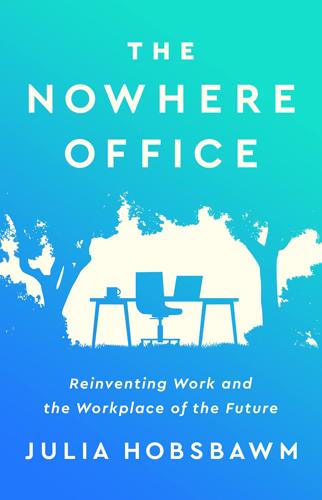
The Nowhere Office: Reinventing Work and the Workplace of the Future
by
Julia Hobsbawm
Published 11 Apr 2022
Take sociologist David Graeber’s highly influential 2018 book Bullshit Jobs, which built on an essay he’d written five years earlier, arguing that it is political control of the workers by the owners of capital/business which ensures that the shorter working shifts, which technology was supposed to usher in, constantly elude most workers, and as a result so too does a life of more meaning. The issue is surely this: how can you be productive in any job if it holds no meaning and is poorly or unfairly managed? A nuanced view of ‘bullshit jobs’ was developed by the philosopher Hannah Arendt in 1958 when she argued that through the vita activa of work, labour and action, we engage with the world, and our lives have meaning which is determined by who we are as workers.
…
(Atlantic, 2021) Ferriss, Tim, The 4-Hour Work Week (Vermilion, 2011) Handy, Charles, The Empty Raincoat: Making Sense of the Future (Random House Business, 1995) ——, Myself, and Other Important Matters (Arrow Books, 2007) Hougaard, Rasmus, with Jacqueline Carter, and Gillian Coutts, One Second Ahead: Enhance Your Performance at Work with Mindfulness (Palgrave Macmillan, 2015) Ibarra, Herminia, Working Identity: Unconventional Strategies for Reinventing Your Career (Harvard Business Review Press, 2004) Lucassen, Jan, The Story of Work: A New History of Humankind (Yale University Press, 2021) Morrissey, Helena, Style and Substance: A Guide for Women Who Want to Win at Work (Piatkus, 2021) Moshfegh, Ottessa, My Year of Rest and Relaxation (Vintage, 2019) Pew Research Center, ‘On the Cusp of Adulthood and Facing an Uncertain Future: What We Know About Gen Z So Far’, https://www.pewresearch.org/social-trends/2020/05/14/on-the-cusp-of-adulthood-and-facing-an-uncertain-future-what-we-know-about-gen-z-so-far-2/ Rosenthal, Caitlin, Accounting for Slavery: Masters and Management (Harvard University Press, 2019) Weisberger, Lauren, The Devil Wears Prada (Doubleday, 2003) Chapter 3: Shift 3: The Productivity Puzzle Cohen, Josh, Not Working: Why We Have to Stop (Granta, 2018) Crawford, Matthew B., Shop Class as Soulcraft: An Inquiry into the Value of Work (Penguin Press, 2009) Frayne, David, The Refusal of Work: The Theory and Practice of Resistance to Work (Zed, 2015) Graeber, David, Bullshit Jobs: The Rise of Pointless Work, and What We Can Do About It (Allen Lane, 2018) Horowitz, Sara, Mutualism: Building the Next Economy from the Ground Up (Random House, 2021) Jaffe, Sarah, Work Won’t Love You Back: How Devotion to Our Jobs Keeps Us Exploited, Exhausted and Alone (Hurst, 2021) Jeevan, Sharath, Intrinsic: A Manifesto to Reignite Our Inner Drive (Endeavour, 2021) Kanter, Rosabeth Moss, Commitment and Community: Communes and Utopias in Sociological Perspective (Harvard University Press, 1972) Mayer, Colin, Firm Commitment: Why the Corporation is Failing Us and How to Restore Trust in It (Oxford University Press, 2013) Newport, Cal, Deep Work: Rules For Focused Success in a Distracted World (Piatkus, 2016) Russell, Bertrand, ‘In Praise of Idleness’, In Praise of Idleness (Routledge Classics, 2004 [1935]) Shafik, Minouche, What We Owe Each Other: A New Social Contract (Bodley Head, 2021) Sinclair, Upton, The Jungle (Penguin, 2002 [1906]) Soojung-Kim Pang, Alex, Rest: Why You Get More Done When You Work Less (Penguin Life, 2017) Wooldridge, Adrian, The Aristocracy of Talent: How Meritocracy Made the Modern World (Allen Lane, 2021) Chapter 4: Shift 4: New Networks Baker, Wayne, Networking Smart: How to Build Relationships for Personal and Organizational Success (McGraw-Hill, 1994) Burt, Ronald S., Brokerage and Closure: An Introduction to Social Capital (Oxford University Press, 2007) Cairncross, Frances, The Death of Distance: How the Communications Revolution is Changing Our Lives (Harvard Business Review Press, 2001) Christakis, Nicholas A., and James H.
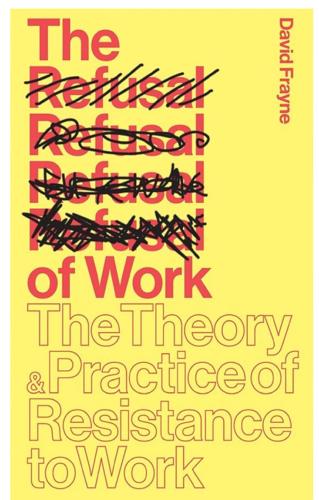
The Refusal of Work: The Theory and Practice of Resistance to Work
by
David Frayne
Published 15 Nov 2015
Jander (1986) ‘Alienation, Freedom and Utopia: Interview with André Gorz’, Telos, 70, pp 199–206. http://dx.doi.org/10.3817/0386067199 Gorz, A. (1989) Critique of Economic Reason, London, New York: Verso. Gorz, A. (1999) Reclaiming Work, Cambridge: Polity Press. Gorz, A. (2010) The Immaterial, Calcutta: Seagull Books. Graeber, D. (2013) ‘On the Phenomenon of Bullshit Jobs’, Strike! Magazine Online, 17 August (available at: http://strikemag.org/bullshit-jobs/). Granter, E. (2009) Critical Social Theory and the End of Work: Rethinking Classical Sociology, Farnham: Ashgate. Green Party (2014a) ‘How many of us would like to work shorter hours, spend more time with the family, more time in self advancement?
…
One of the things that is troubling from Gorz’s perspective is the sheer pointlessness of many modern forms of employment. Huge proportions of the labour market are devoted to the production, marketing and distribution of consumer goods with superficial differences, limited functions, and short life spans. In his polemic against the rise of ‘bullshit jobs’, David Graeber also points to the unprecedented expansion of sectors such as corporate law, academic and health administration, human resources, and public relations. On top of this, we can consider the huge numbers of people whose role is to provide administrative, technical or security support for these industries, as well those thousands of jobs in the service industries – from dog-washers to home cleaners and 24-hour pizza deliverymen – which only exist because the workers who pay for them are so hellishly busy working (Graeber, 2013).
…
Index * * * A achievement, social, measured through work, 15 Adam, a former computer programmer, 120, 127–8, 138–41, 170, 180 Adorno, Theodor, 69–72, 75, 76–7, 162; ‘Free Time’, 69 advertising, 85–8, 171; spending of industry, 88 affluence, ideals of, 181 agoraphobia, 152, 153 Alan, a former office administrator, 157–8 alienating tendencies, use of term, 62 alienation, 9, 48, 50, 61, 62, 63, 90, 93, 126, 146, 178, 200, 230; in Marx, 46, 47; normalisation of, 52; use of term, 51 alternatives: experimenting in, 223; utopian, 145 altruism, 113 Amazon, working conditions at, 51 anger management techniques, 53 Anne, a photographer, 127, 170; co-founder of Idlers’ Alliance, 207–8 anti-consumerist ethics, 163 anxiety, 13, 148, 151, 152, 164, 200; about education, 79; in face of consumer choices, 168 apricots, cultivation of, 79 Arendt, Hannah, 24, 39 Aristotle, concept of good life, 4 art of living, 4 Ashton, John, 229 ATOS company, 104; scandal regarding, 152 autonomous activities, 20 autonomous self-development, 36; right of, 35 autonomously organised production, 112 autonomy, 10, 29, 64, 91, 113, 141, 142, 150, 198, 205, 210–37; in work, limits to, 61–6; moral, 155; of workers, 69 B bakeries, production process in, 51–2 Basic Income, 225; as personal entitlement, 226; universal and unconditional, 225 Bauman, Zygmunt, 73, 159–60, 169–70 Beck, Ulrich, 73 being, mode of being, 79–80, 166 ‘being yourself’’ in work, 59–60 Bell, Daniel, 26 Ben, husband of Cheryl, 178, 179 benefit fraud, claimed costs of, 101 benefits, conditionalities of, 104 Berardi, Franco, 54–5, 81 Berger, Peter, 125, 128, 130, 144; with Thomas Luckmann, The Social Construction of Reality, 125 Beveridge, William, 28 Billig, Michael, 231 binary dichotomies in society, 99 biomedical labels: adoption of, 151–2; resistance to, 152, 153 black working class, rebellion of, 115 Black, Bob, The Abolition of Work, 206 Black, Carol, 108 Blauner, Robert, 48, 62 body, starts shouting, 149 see also broken body books: from libraries, 206; on subject of work, 206–7; reading of, 175, 195 boredom at work, 12, 140 Bowring, Finn, 116, 171 Braverman, Harry, 48 breakpoints, 125, 128, 129, 141, 142, 154, 216; causes of, 129; relating to personal health issues, 148 Brennan, Teresa, 148 Bridge, Angela, 189–90 broken body, 147–54 Brown, Philip, 42 Bruce, a former care home worker, 137, 146, 148–51, 200, 202, 203, 204 ‘bullshit jobs’, 40 bureaucracy at work, 132; intensification of, 133 Burroughs, William, 206 C ‘Californian ideology’, 59; boundaries of, 60 call centres, labour practices in, 50–1 calmer life, living of, 151 Calvin, John, 25 Cameron, David, 99 Cannon, David, 154–5, 233 capitalism, 24, 37, 44, 48, 64, 65–6, 147; as production of needs, 85; development of, 25–6, 29, 39–40; fixated on work and consumption, 3, 4; industrial, 30; insecurity in, 73; potential reduction of working time in, 32–3; resistance to, 188; spirit of, 25–6 career, concept of, 127 Casey, Catherine, 16–17, 56–7, 58, 212 casual labour, 28 Cederström, Carl, and Peter Fleming, Dead Man Working, 55 Chaplin, Charlie, in Modern Times, 49 character assessment of workers, 56 cheese, buying of, 169 Cheryl, an interviewee, 120, 165–7, 176–7, 178 child-friendly policies, 116 childcare, 155, 206, 211 children, a factor in decision-making, 161 chirpiness, required in job, 136 Christmas, celebration of, 145, 186 cinema attendance, moral panic regarding, 96 Citizens Advice Bureau, 153 city spaces, privatisation and commercialisation of, 222 claimants, viewed as wasters, 99 claiming benefits, viewed as game, 135 Clive, an interviewee 201 clubbing together to get something done, 22 cognitive labour, 54–5 Cohen, Stanley, 126, 127, 129, 210 Cole, Matthew, 106, 205 collaborative forms of work, 64 Collinson, David, 213 colonisation of life: by economic demands, 9, 93; by work-related demands, 67–94 commodification, 92 commodity-intensive lifestyle, questioning of, 164 commons, abolition of, 186 commuting, costs of, 178 company people, creation of, 56 computerisation, of bakery, 51–2 computers, 50, 61, 72, 139–40, 172, 175, 177; gaming, 177 conditions of work, 226, 233 ‘constantly on call’, 72 consumer motivation, theories of, 88–91 consumer satisfaction, 85 consumer society, 26–7 consumerism, 40, 83–4, 91, 162–3, 169, 214, 228, 231; costs of, 160; depends on exploitation, 167; ethically conscious, 87; motivation for, 85, 178 consumers: needs of, exaggerated, 92; persuasion of, 86 consuming less, 172, 187 consumption: de-spiritualisation of, 176; gospel of, 82–94; growth of, 94; ostentatious, 186; replaces self-production, 92; therapeutic, 180 convenience, need for, 178–9 convenience commodities, consumption of, 91 conversation, love of, 137–8, 141 conviviality, as valued good, 116 cooking of meals, 145; pleasures of, 176–7, 187 coping strategies at work, 11 Coupland, Douglas, Generation X, 114 Cremin, Colin, 58, 76 customer complaints procedures, 54 CVs, preparation of, 75 cynicism, 12, 212–13 D Dalla Costa, Mariarosa, 115 dead end, experience of, 141 death, witnessing of, 130 debt, of students, 81 decentralisation of work, 32 deindustrialisation, 107 ‘delusions’ of workers regarding work, 21, 22 democracy, 215; engagement in, 222; in the workplace, 13 denaturalisation of work, 17, 216 Department of Trade and Industry (UK), work–life balance study, 218 dependency, alleged culture of, 100 depression, 148, 152 de-reification, 128, 144 desires, consumerist, pursuit of, 170 deskilling of work, 42, 48 diet, simplicity of, 136 dignity, 137, 193 disabilities see people with disabilities disability allowances, 152, 153 discipline at work, 28 discreditable, 200–1 dis-ease, feeling of, 130 disengagement from work, 47–52 dis-identification, 213 dissatisfaction, organised creation of, 85 distribution of income, 14 Dittmar, Helga, 88 division of labour, 28, 29, 48, 133, 146; gendered, 229–30 ‘doing nothing of value’, 141, 190, 233 domestic work, 19 see also outsourcing of domestic work downshifter, use of term, 120 downshifter study in USA, 165 Dubi, Steve, 46 Duncan Smith, Ian, 102 E eating together: pleasure of, 143, 144, 147; whittled away, 176 economic growth, 34, 37 education, 78; aims of, 80; anxiety context of, 79; as certification for work, 69; as socialisation, 15; broad, value of, 79; investment in, 42 eight-hour day, 71 Eleanor, an interviewee, 120, 124, 129, 144, 161–2, 167–8, 182, 183, 207 Emma, an interviewee, 196–7, 198–9, 202–3 emotional conduct, management of, 62 emotional investment, in office work, 136 emotional labour, 52–3, 57, 137 emotions, management of, 53–4 employability, 6, 9, 15, 16, 81, 82; discipline demanded by, 77–8; pressure of, 73–82 employee appraisals, 54 employers, 76–7 Employment Support Allowance (ESA), 148, 153 employment, paid see paid employment encirclement by the market, 92 ‘end of work’, argument, 33, 35, 36, 82 Engels, Friedrich, 74 entitlement, alleged culture of, 100, 103, 232 environmental awareness, 168 escapes, 129; construction of, 12 escapism, 10, 27, 210–37 ethical reflection, need for, 217 ethically dubious work, 135 see also worthwhile ethic eudaemonia, 4 Euro May Day movement, 115 exclusion, social, 161 extra hours, working of, 57 F Facebook, 88 factories, closure of, 106–8 family, work as, 56–7 family life: importance of, 230; prioritising of, 218 feminism, 22; interest in shorter working hours, 229; second-wave, 114–15 Fevre, Ralph, 106 Ffion, an interviewee, 145, 167, 170, 177, 181 Fisher, Mark, 214, 229 five-day week, 97 Fleming, Peter, 59–61, 64, 212–13 Fletcher, Harrell, 189 flight attendants, working conditions of, 53 ‘flow state’ condition, 12 Ford, Henry, 95 Ford assembly line, 48 foreign encounters, power of, 144 four-day week, recommended for public health reasons, 229 Fourier, Charles, 30–1 France, 35-hour week legislation in, 223–4 Frankfurt School, 2, 35 Franklin, Benjamin, 28 free choice of work, 31 free-time, 29, 33, 39, 40, 69–72, 123, 155, 157, 221, 228; as continuation of work, 72; as valued good, 116; authentic, 82; ‘excessive’, 83; experience of, 162; fragmentation of, 71, 73; increase of, 38; preservation of, 24; reabsorption of, 84; scarcity of, 41, 173, 175 freedom from work, 38 freelance work, 155 friendliness, simulation of, 54 Fromm, Erich, 79, 80, 166 Fryer, D., 109 full-time working, 90, 110–11, 141; resistance to, 28, 29 fun, culture of, in work, 59–60, 62, 213, 232 G Galbraith, J.
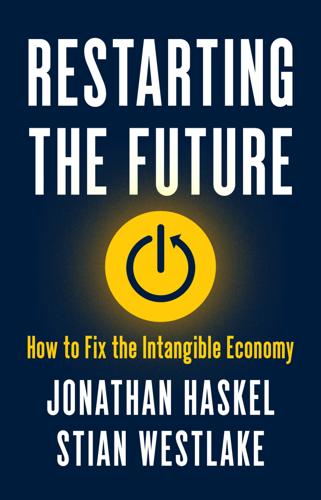
Restarting the Future: How to Fix the Intangible Economy
by
Jonathan Haskel
and
Stian Westlake
Published 4 Apr 2022
The final disappointing feature of the economy in the twenty-first century is not something that economists talk about, but it looms large in laypeople’s discussions. We call it inauthenticity or fakeness: the idea that workers and businesses lack the grit and authenticity they should have, and that they once had. Consider anthropologist David Graeber’s critique of “bullshit jobs”: “Through some strange alchemy, the number of salaried paper-pushers ultimately seems to expand” even while “the lay-offs and speed-ups invariably fall on that class of people who are actually making, moving, fixing, and maintaining things.”3 Graeber’s critique follows in the footsteps of postmodernists such as Jean Baudrillard, who argued that the modern world is dominated by “simulacra”: imitations and symbols that, like Disneyland, take on a new life of their own that is detached from the underlying reality.4 Likewise, the conservative commentator Ross Douthat has argued that one of the characteristics of modern decadence is the prevalence of imitation rather than originality in culture, media, and entertainment.
…
In this context, the many attempts to find the right combinations, which often take the form of remixing or reworking, should not come as a surprise. It is what we expect to see in a society rich in intangibles. The concern over the loss of “real” jobs also relates in part to the great value found in exploiting the synergies of intangibles. In fact, many of the “bullshit jobs” that Graeber identified involve attempts to exploit synergies. In the context of manufacturing, intangibles provide a different explanation. When people think about manufacturing, they often think of tangible assets: factories, machine tools, production lines. But when we look at rich countries that have been able to maintain relatively large manufacturing sectors—Germany and Japan are prime examples—we find that their competitive advantage relies mostly on intangible assets: skills and training among their workforce, R&D and design abilities that allow them to stay at the cutting edge of product technology, and constant improvement in processes (such as Lean and Six Sigma) to mitigate high unit labour costs.
…
Faltering Innovation Confronts the Six Headwinds.” National Bureau of Economic Research working paper no. 18315. https://doi.org/10.3386/w18315. ________. 2016. The Rise and Fall of American Growth: The U.S. Standard of Living since the Civil War. Princeton, NJ: Princeton University Press. Graeber, David. 2018. Bullshit Jobs: A Theory. London: Allen Lane. Greenwald, Daniel. 2019. “Firm Debt Covenants and the Macroeconomy: The Interest Coverage Channel.” Society for Economic Dynamics, 2019 Meeting Papers 520. https://ideas.repec.org/p/red/sed019/520.html. Greif, Avner. 2006. Institutions and the Path to the Modern Economy: Lessons from Medieval Trade.
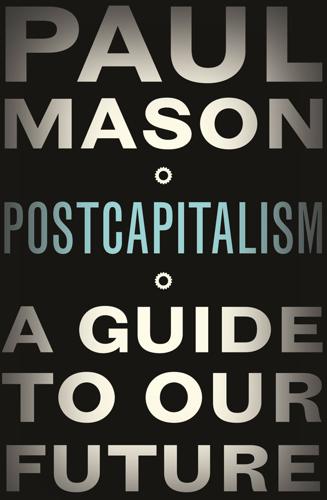
Postcapitalism: A Guide to Our Future
by
Paul Mason
Published 29 Jul 2015
Technologically, we are headed for zero-price goods, unmeasurable work, an exponential takeoff in productivity and the extensive automation of physical processes. Socially, we are trapped in a world of monopolies, inefficiency, the ruins of a finance-dominated free market and a proliferation of ‘bullshit jobs’. Today, the main contradiction in modern capitalism is between the possibility of free, abundant socially produced goods, and a system of monopolies, banks and governments struggling to maintain control over power and information. That is, everything is pervaded by a fight between network and hierarchy.
…
The equivalent of the printing press and the scientific method is information technology and its spillover into all other forms of technology, from genetics to healthcare to agriculture to the movies. The modern equivalent of the long stagnation of late feudalism is the stalled fifth Kondratieff cycle, where instead of rapidly automating work out of existence, we are reduced to creating bullshit jobs on low pay, and many economies are stagnating. The equivalent of the new source of free wealth? It’s not exactly wealth: it’s the externalities – the free stuff and wellbeing generated by networked interaction. It is the rise of non-market production, of un-ownable information, of peer networks and unmanaged enterprises.
…
The advantages of working remain clear, but there are also advantages to be gained through not working: you can look after your kids, write poetry, go back to college, manage your chronic illness or peer-educate others like you. Under this system, there would be no stigma attached to not working. The labour market would be stacked in favour of the high-paying job and the high-paying employer. The universal basic income, then, is an antidote to what the anthropologist David Graeber calls ‘bullshit jobs’: the low-paid service jobs capitalism has managed to create over the past twenty-five years that pay little, demean the worker and probably don’t need to exist.10 But it’s only a transitional measure for the first stage of the postcapitalist project. The ultimate aim is to reduce to a minimum the hours it takes to produce what humanity needs.
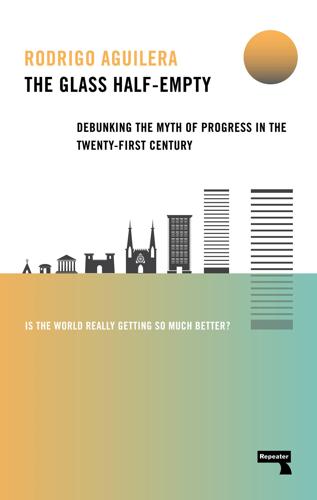
The Glass Half-Empty: Debunking the Myth of Progress in the Twenty-First Century
by
Rodrigo Aguilera
Published 10 Mar 2020
That modern capitalist economies increasingly gravitate towards monotonic, value-less jobs goes a long way towards understanding why affluence (as measured by the metrics that the New Optimists prefer) is not offsetting the dissatisfaction and alienation seen in societies that equate work with self-worth. Anthropologist David Graeber describes the glut of these occupations in the aptly named Bullshit Jobs: A Theory: Those who work shit jobs tend to be the object of indignities; they not only work hard but also are held in low esteem for that very reason. But at least they know they’re doing something useful. Those who work bullshit jobs are often surrounded by honor and prestige; they are respected as professionals, well paid, and treated as high achievers — as the sort of people who can be justly proud of what they do.
…
US businesses have already enjoyed a windfall of trillions of dollars in de facto subsidies from the stagnation of wages since the late 1970s relative to productivity — in a truly competitive labor market they should grow in tandem. Although the gap between productivity and wage growth has been growing in the West, in the US the latter has remained virtually flat for four decades (Figures 6.9-6.10). In light of the epidemic of so-called “bullshit jobs”, one must wonder whether there might not be a corresponding epidemic of “bullshit firms” which only remain profitable due to these exorbitant privileges. Figure 6.9: Wages are not catching up with productivity in the US Notes: The decoupling of productivity and wages has been an ongoing phenomenon in the US since the early 1970s, but truly became apparent from the 1980s onward.
…
A Literature Review”, Institute for Global Prosperity. 2019, https://ubs-hub.org/litreview2019/ 38 “Our Common Wealth: A Citizen’s Wealth Fund for the UK”, IPPR, Mar. 2018, https://www.ippr.org/files/2018-04/cej-our-common-wealth-march-2018.pdf 39 It has not been published in English at time of writing. Information on his proposals is from Elliott, L. “Thomas Piketty’s new War and Peace-sized book published on Thursday”, Guardian, 9 Sep. 2019, https://www.theguardian.com/business/2019/sep/09/thomas-pikettys-new-magnum-opus-published-on-thursday 40 Graeber, D., Bullshit Jobs: A Theory (Simon & Schuster, 2018), pg. 23 41 Brady-Turner, C., “The Relentless Misery of Working Inside an Amazon Warehouse”, OneZero, 11 Mar. 2019, https://onezero.medium.com/relentless-com-life-as-a-cog-in-amazons-e-tail-machine-d46b3ef05eb8 42 An excellent recent account of the authoritarian personality is Milburn, M.A. and Conrad, S.D., Raised to Rage: The Politics of Anger and the Roots of Authoritarianism (MIT Press, 2016) 43 “Was the EU Referendum Advisory?”

Making It in America: The Almost Impossible Quest to Manufacture in the U.S.A. (And How It Got That Way)
by
Rachel Slade
Published 9 Jan 2024
Those kinds of physical, repetitive, completable activities tickle an essential part of the human brain—the one that we needed to survive all those millennia in the natural environment. In other words, nourishing the maker frees the thinker. And more about that happiness: in 2018, anthropologist David Graeber published the bestselling Bullshit Jobs: A Theory, in which he argued that half of the jobs modern people hold today are “pointless” because they produce nothing but busywork. America’s service economy depends on layer upon layer of middlemen and administrators who only increase the complexity and cost of basic systems, like health care, at the expense of true wealth- and stability-generating industries, like manufacturing.
…
Friedman, Arthur, and Jessica Binns. “Support at House Hearing to Punish China over Uyghur Forced Labor.” Sourcing Journal, September 17, 2020. Gilpin, Toni. The Long Deep Grudge: A Story of Big Capital, Radical Labor, and Class War in the American Heartland. Chicago: Haymarket Books, 2020. Graeber, David. Bullshit Jobs: A Theory. New York: Simon & Schuster, 2018. Green, Mark. “Trade Talk: Should Labor Standards Be Included in Free Trade Agreements with the United States? Implications for Asia.” Wilson Center. Greenhouse, Steven. Beaten Down, Worked Up: The Past, Present, and Future of American Labor.
…
A B C D E F G H I J K L M N O P Q R S T U V W X Y Z A Abercrombie & Fitch, 257, 257n AFL-CIO, 53, 64, 197, 216 American Roots and, 160, 177, 200, 216 CEO-to-worker pay ratio tracked, 257 conventions and meetings, 112, 112n, 129, 160–62, 200 Democratic Party and candidates, 52–53, 70, 74 promotes domestic manufacturing, 73 Trumka and, 62, 70, 73–74, 160, 274 Washington headquarters, 63, 220 Waxman working for, 52–53, 61, 62, 67, 82, 94, 188–89, 199, 289 Whirlpool plant shutdown and, 78–80 See also labor unions; Trumka, Richard; specific unions Africa, 4, 26, 122–23, 123n, 262n, 284 Made in Africa consortium, 123n used clothing exported to, 22 See also specific countries agricultural monoculture, 152–54 Alfond, Harold, 189, 191–92 Alfond, Justin, 189–91, 193, 211 Alibaba, 224 Alibrio, Gina, 221, 293 Allen, Tom, 52 Allende, Salvador, 72 Alliance for Retired Americans, 67, 91–92 Allied Textiles, U.K., 46–47 Alloiding, Simeon, 39, 51 Amalgamated Bank, 287–88 Amalgamated Clothing Workers of America, 287 Amalgamated Housing Cooperative, 287 Amazon, 261 Bessemer warehouse, 241, 242 business model, 269–70 damage to U.S. manufacturers, 269 problematic labor practices, 112n selling Chinese goods, xii, 270 as start-up, in Kentucky, 268–69 turnover rate, 269 unionization effort at, 241–42, 269 American Apparel, 232, 232n, 252, 264–67 American Cord & Webbing, Woonsocket, Rhode Island, 156 American Fabrics, New York City, 166–71, 235–36 American manufacturing academia abandons, 74 automation and, 300–301 benefits of, 300 Biden administration and, 286–87, 301 company closures, 18, 20, 74, 77–78 costs and profits, 247–48 China’s takeover of global markets and, 68, 69 Covid pandemic and, 238 Devlin on bringing it back, 196–98 as essential to the nation, 5, 29, 113 generational shift and demise of, 103 government’s role in reviving, 7, 8, 114, 296–97, 300–301 greed’s destruction of, 69, 78, 94 Hamilton and, 7–8, 296 health insurance burden, 296–97, 297n immigrant/New American employees, 121, 301–3 (see also American Roots) innovation and, 296, 298, 299 Jefferson’s vision, 9 labor crisis and, 118, 282 last days of Carleton Woolen Mills and, 45–48 Lawrence, Massachusetts, and witnessing the life cycle of, 106–11 “made in America” products, 171, 240 NAFTA’s destruction of, number of manufacturers and jobs lost, 18, 45–46, 118 number of companies, employees today, 5 offshored amount by 1990, 68 offshoring and, 4, 18, 26, 27, 68, 69, 77, 129, 257, 260, 261–62, 263 (see also Bangladesh; China; Mexico; Vietnam; specific countries) onshoring revival, 113–14, 238, 242, 290–91, 293, 296 Pilchman’s pessimism about, 170–71 poor management training, 294, 294n quality of, 22, 300, 300n shareholder profit and, 263n shipbuilding and, 204 size of (2022), 4 sourcing as difficult, 193 tariffs as important to, 198 Taylorism and, 255–57 union investment in, 161, 287–88 unions and, 20, 73, 99, 288 (see also labor unions) Walmart and, 261–62 Waxman’s dream and, 95, 99 WeatherTech and, 227–28 worker protections and, 183 workforce training, 297, 301 workplace safety, 22, 183 work satisfaction and, 298–99 WTO and the destruction of, 192 See also labor unions; NAFTA; supply chain; textile and clothing production American Revolution, 5–6, 7, 11, 13 American Roots, Westbrook, Maine, 28, 234, 287 American-sourced materials and, 29, 111, 129, 231–37, 295 Bailey as consultant, 252–55, 264–68, 271–73, 278–81 branding alliances and, 289 business model, 176, 236 cash and investment capital shortage, 176, 186–88, 289–90 cost-saving decisions, 119 Covid pandemic and, 200–201, 209, 210, 213–15, 223–24, 239, 242–43, 276, 285 Covid pandemic PPE manufacturing pivot, 214–19, 224, 225, 226 customer targeted by, 111–12, 149, 158, 160, 177–78, 179 downsizing workforce, 225, 276 economic impact of, 242, 295 employee diversity, 299 employee hiring, 120, 121, 123, 282 employee hiring, immigrants/New Americans, 123, 127, 179–80, 215, 221–22, 245, 272–73, 283–84, 285, 294, 303–4 employee priorities, 281–82 employee recruitment, 285 employee salaries, benefits, 175, 248, 250, 269, 286 employee stress, 178–79, 248, 254, 279–80 employee training, 112, 119–20, 121, 248 employee welfare, 113, 114 financial problems (2017), 160 founding of, 111–15 goals for growth, 254 hoodie made by, 28, 140, 149, 150–52, 158–60, 271 hoodie manufacturing, finding suppliers, 141–44, 152, 156–57, 159–60, 225 hoodie order by Painters Union, 157, 158–60 hoodie order by TWU, 163–71 hoodie zipper, 142–44, 147 industrial sewing machines for, 149 January 6 response by, 229–30 kaizen method and, 264–65 logo, 239, 243, 273 management, 178–79, 220–21, 252, 254, 277–78 mission statement, 28–29, 239–40, 251 monthly overhead and payroll, 209 murder of George Floyd and, 221 naming of, 113 new equipment and improvements (2021), 227, 239 office of Ben Waxman at, 175–76, 195, 220, 253, 254, 291 online presence, 209 patternmaker for, 116–19, 150–51, 244 piece-rate payment, 265–67, 280, 281 Pilchman and, 170, 231–32 PolarFleece vests and, 105, 111, 114–16, 119, 127–31, 132 post–Covid pandemic, pivoting back to clothing, 239 pricing of merchandise, 171, 247, 286 production costs and problems, 119, 243–45, 247–55, 267–68, 279 production revamped, 255, 271–73, 278–81, 290 raising capital, investors, and strategic team, 188, 189, 193–94, 199, 211, 214, 227, 291 revenue (2016), 128 revenue growth (2018 to 2023), 172, 179, 186, 224, 226, 254, 276, 290 salary of founders, 113, 257 sales and marketing, 127–28, 157, 158, 177–78, 209–10, 239–40, 276 (see also Waxman, Ben) size, number of employees, 179, 226 success of, 290–92 testimonials and accolades, 171 union labor and, 28, 29, 175 union leader Jabbir and, 160–62, 175 union support for, 165, 176, 177–80 values of, 188 Waxman home as collateral, 201 “wearing your values” and, 240 WeatherTech T-shirt order, 227–28 Westbrook factory, 172, 174–75, 189, 217, 219, 278–79 white supremacists target, 179–80 See also Waxman, Ben; Waxman, Whitney Reynolds Andersen, Kurt, Evil Geniuses: The Unmaking of America, 11 Anderson, Wes, 119 Angola, 124, 125, 126, 283, 285 Antonelli, Paola, 132 Appalachian Mountains, 53 Ares, Jessica, 39 Arkwright, Richard, 6–7 Arlington Mills, Lawrence, Massachusetts, 106, 109 ASHP (American Society of Health-System Pharmacists), 299, 300n Asplundh tree service, 136 As Steel Goes (Brooks), 58 Atkinson, Robert, 68 B Bailey, Marty, 252–55, 257–60, 262–68, 301 American Roots and, 271–73, 278 Moroccan T-shirt video, 265, 272 Bangladesh, 24, 25, 27n, 29, 114, 257 banking deregulation, 94 Glass-Steagall Act, 94 subprime mortgages and mortgage-backed bonds, 94–95 Barchiesi, Rich, 60 Bartram, David, 18 Bassett Furniture Company, North Carolina, 69 Bella + Canvas, Los Angeles, 244 Bernstein, Leonard, 106 Bethlehem Steel, 77 Bezos, Jeff, 240–41, 269 Biaya, Robert Mbaya, 122, 123–27, 284 Biden, Joe, 32, 112n, 286 pro-union administration, 286–87 trade agenda, 235, 286–87 Black Mass (film), 119 Bobe, Ludovic Ndengabeka, 244, 247, 273 Boeing, 262 offshores 737 MAX production, 262 Born, Doug, 216 Boston Globe, 173 Bottle of Lies: The Inside Story of the Generic Drug Boom (Eban), 299n Boyle, Tony, 64–65, 67 Bradley, Bill, 50–51 Bretton Woods, New Hampshire, 174 British East India Company, 12–14 Brooks, Robert R., As Steel Goes, 58 Brown, Roxanne, 218 Buffett, Warren, 192–93 Bullshit Jobs: A Theory (Graeber), 298 Bureau of Labor Standards, 183–84 Burkhardt, Jonathan, 61–62, 92 Burns, Cam, 239–40 Bush, George H. W., 15 Bush, George W., 52, 62, 63, 91 Butler, Dave, 180, 221 Buy American Act of 1933, 129n Berry Amendment, 129n, 232n C Cambodia, 25, 38, 257 Cameron, David, 138 Campbellsville, Kentucky, 257–58 Amazon and, 268–69 Fruit of the Loom closure, 268 Carhartt, 27, 139 Carleton Woolen Mill, Winthrop, Maine, 45–48 Carnegie, Andrew, 180 Cartwright, Edmund, 8 Cascade Woolen Mill, Oakland, Maine, 40–41 Casco Bay Wool Works, Portland, Maine, 39–49, 100 closing of, 49 founding of, 40 income growth and employees, 44–45 loss of suppliers, 48–49 Maine Maid Outerwear, 39–40, 44 NAFTA and closing of, 45–46 CFTC (Commodity Futures Trading Commission), 156 Champion Mills, 135 bought out by Sara Lee (1989), 139 factory moved to China, 168 factory moved to North Carolina, 139 NAFTA and move to Mexico, 139 sweatshirt produced by, 135–36 Charney, Dov, 252, 264 Child Labor Amendment of 1924, 134 Chile, 72–73 China American apparel, percentage produced by, 231 American manufacturing sent to, 18 American mills that offshored to, 168–69 Biden administration and, 275 as biggest cotton buyer, 156 British East India Company and, 13–14 Champion Mills moved to, 168 as competitor for American-made goods, 143, 231 currency manipulation and, 212 development of Suzhou, 85–86 global manufacturing domination, 68 global cotton market and, 231–34, 235 hourly rate for labor in, 169 as market for western goods, 46–47 sanctions on, and retaliation, 233 subsidizing manufacturers, 68, 212 sweatshirt production, 29 textile and clothing production domination, 129, 257 as a threat to the U.S., 68 unfair trade practices, 68 U.S. tariffs and, 68 U.S. trade deficit to, 68 Uyghur oppression, 233–34 WHO and, 18, 68, 143 workforce in, 86 CHIPS-Plus Act of 2022, 296 Chouinard, Yvon, 110 CIA, 13, 15 in Chile, 72 in China, 246 in the Congo Republic, 246 Contras and, 15 in the DRC, 246 right-wing coups and, 15, 71 Operation Condor, 15 Cinderella Man (film), 100 Cleaves, Adam, 279 Coal Industry Retiree Health Benefit Act of 1992, 195–96 Coastal Enterprises, Inc., 119 Colbert, Stephen, 140 Cold War, 71–72 Common Threads, Portland, Maine, 122–23, 123n, 128 Congo, Democratic Republic of (DRC), 123–24 Congo Republic, 245–47 Congress of Industrial Organizations (CIO), 64 Conway, Thomas, 217 Coolidge, Calvin, 204, 205 Corbyn, Jeremy, 73 Cornered: The New Monopoly of Capitalism and the Economics of Destruction (Lynn), 259, 261 Corson, Holland, 293 cotton China and, 156, 231–34, 235 cotton gin and, 8–9, 155 environmental issues, 154 futures market and, 156 ginning co-ops, 155 Indian cotton, 154–55 Monsanto’s seed monopoly, 154 Noxubee harvest, 154–55 Pilchman’s American Fabrics and, 168, 231–32 price increases, 231–32 quality monitored by the USDA, 156 U.S. exports, 155–56 U.S. as major grower, 132, 152–56 Covid-19 pandemic, 200–201, 211–13, 227, 234, 242–43, 276, 285 American Roots and, 200–201, 209, 210, 213–19, 223–26, 239, 242–43, 276, 285 brands cancelling orders and, 24 companies closed by, 193, 276 dependency on imports and, 211 drug shortage during, 299, 300n hoarding and, 213–14 market uncertainty and, 232, 276 masks and PPE shortage, 211, 214 national divisiveness and, 222 raw goods shortages, 231 Sintex Industries bankruptcy, 156 vaccines, 231 Waxmans’ Washington Post op-ed, 218, 220 Crawford, Lucy, 5–6, 7 Crown family, 78, 79 Obama and, 78 Whirlpool plant shutdown, 78–80 cryptocurrencies, 14n CSIS (Center for Strategic and International Studies), 297 D Daitch, Mike, 239–40 Dana, Woodbury, 174–75 Dana Warp Mill, Westbrook, Maine, 172, 174–75 Dartmouth College, 102 Davis, Isaac, 201–2 Dawes Act of 1887, 203 de Kooning, Willem, 59n Dell, Michelle, 88–89 Delphi Automotive, Dayton, Ohio, 77 Delta Air Lines, 153 Democratic Party AFL-CIO and, 52–53, 70, 74 free trade, offshoring, and, 70 neoliberalism and, 70, 195 Department of Defense (DOD) prison labor used by, 129–30n required to purchase American-made goods, 129n, 130, 232 spending on textiles and apparel (2021), 129n Depp, Johnny, 119 Devlin, Patti, 193–97, 211, 274 American Roots investment, 196, 227 on bringing back American manufacturing, 196–98 Dexter, Maine, 189–90 Dexter Shoe Co. in, 189, 190, 191–93 Dickens, Charles, 9 Du Pont family, Winterthur museum, Delaware, 34 E Eastman Kodak, 83–85 Japan’s Fujifilm imports and, 84, 85 Eban, Katherine, Bottle of Lies: The Inside Story of the Generic Drug Boom, 299n Eddie Bauer, 110 Eisenhower, Dwight D., 63, 207 Enter the Wu-Tang (album), 137 environmental issues agricultural monoculture, 152–54 cotton and, 154 fabric dye disposal and, 22 GDP not inclusive of, 17 textile manufacturing and, 21–22 used clothing disposal, 22–23 WTO’s detrimental effects, 16 Esquire, 146 Trumka profile, 78–79 Evans, Walker, 59n Evil Geniuses: The Unmaking of America (Andersen), 11 F Factory Man (Macy), 68–69 Fair Labor Standards Act of 1938, 134 Fairness Doctrine, 191 Fall River, Massachusetts, 217, 243, 279 Merrow company in, 40, 244–45, 247 Fanatics, 289 Farley, William, 258–59, 260 Farmstead Magazine, 33 FDRA (Footwear Distributors & Retailers of America), xii Federal Prison Industries, 129–30n Feinbloom brothers, 135–36 Fetterman, John, 139, 139n Feuerstein, Aaron, 105–6, 109–11, 129, 130 Feuerstein, Raphael, 110 Feuerstein, Samuel, 105–6 Flowfold company, Maine, 213 Floyd, George, 220, 241 Ford, Henry, 203, 256 Frazier, Joe, 137n free trade/free market theory, 4–5, 11–15, 24, 33, 63, 71 American economy and, 19, 235 Chile and, 72–73 devastating effects of, 19, 20, 91 ethical or social agenda absent, 23 first American victims of, 18 IMF and, 71 NAFTA and, 15–16, 18–19 Reagan and, 185 USMCA and, 19 WTO and, 16, 22, 84 See also NAFTA Friedman, Milton and Rose, 11–12, 14, 72, 111 Friedman, Vanessa, 139 Frost, Robert, 106 Fruit of the Loom, 234, 252, 257–60, 268 bankruptcy of, 263, 264 Farley takeover, 258–59, 263–64 offshore production of, 262–63 stock buyback at, 263–64, 263n G General Dynamics, 79 George, Billy, 53, 59 Gildan Activewear SRL, 232 Gingrich, Newt, “Language: A Key Mechanism of Control,” 192 Glass-Steagall Act, 94 globalization, 18, 70 Buffett’s miscalculation about, 192 NAFTA, WTO, and, 192 U.N.
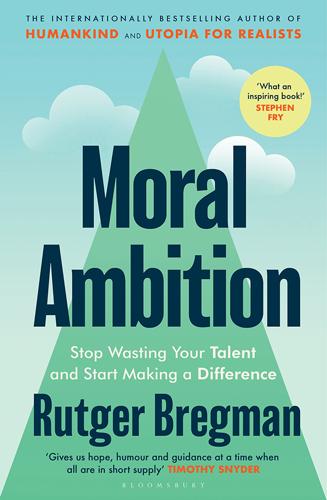
Moral Ambition: Stop Wasting Your Talent and Start Making a Difference
by
Bregman, Rutger
Published 9 Mar 2025
Recent research shows that about 8 per cent of all employees think their own job is pretty pointless. Another 17 per cent confess to having some doubts about whether their job contributes to society.5 The late anthropologist David Graeber (1961–2020) had a highly technical term for such positions: bullshit jobs.6 What jobs are we talking about here? Well, we know which ones it’s not. In 2020, at the start of the Covid-19 pandemic, lists of ‘essential workers’ popped up everywhere: from cleaning staff to streetsweepers, from teachers to firefighters, and from bus drivers to registered nurses. These are the people who keep the world running; they don’t need a lecture on moral ambition.
…
The same study found that of the people who consider their jobs meaningless for society, three times as many work in the private sector as in the public sector: Robert Dur and Max van Lent, ‘Socially Useless Jobs’, Industrial Relations: A Journal of Economy and Society, Vol. 58, Issue 1 (2019). 6 David Graeber, ‘On the Phenomenon of Bullshit Jobs. A Work Rant’, strike! Magazine, Issue 3 (August 2013). 7 Jeff Hammerbacher, quoted in: Ashlee Vance, ‘This Tech Bubble Is Different’, Bloomberg Businessweek (14 April 2011). 8 Florian H. Schneider, Fanny Brun, and Roberto A. Weber, Sorting and Wage Premiums in Immoral Work, Working Paper No. 353, Department of Economics, University of Zurich (2020).
…
Index abolitionism and slavery here–here, here, here, here–here, here–here, here–here, here, here, here, here–here, here, here–here, here, here–here abortion here, here addiction here, here, here Afghanistan here Against Malaria Foundation (AMF) here–here, here–here, here, here, here, here air pollution here, here, here–here Alzheimer’s here, here American Revolution here Angelou, Maya here animal ambulances here animal welfare and rights here, here–here Anne, Queen here, here Anthony, Susan B. here, here antibiotics here, here, here, here, here, here, here Apollo Program for Biodefense here, here Apollo programme here Appiah, Kwame Anthony here Applebaum, Anne here Arab Spring here Aristotle here Arkhipov, Vasili Alexandrovich here artificial intelligence here, here, here–here Aum Shinrikyo cult here–here autocracy here Aztecs here, here Balk, Josh here Banerjee, Abhijit here Bangladesh here, here, here Bankman-Fried, Sam here–here belief-behaviour gap here Bell Labs here Benezet, Anthony here, here Bentham, Jeremy here Bettencourt, Liliane here bicycles here Biden, Joe here billionaires here–here, here, here, here, here–here biological weapons here, here–here Biological Weapons Convention here Birthler, Marianne here Black Death here Black Lives Matter here, here Bochove, Bert and Annie here Boston Consulting Group here Boswell, James here Bourdain, Anthony here Browder, Aurelia here Buddha here bull-fights here ‘bullshit jobs’ here–here bullying here Bush, George W. here, here Calvinism here Carretta, Vincent here–here Carter, Jimmy here Chanel, Coco here charities, effectiveness of here–here, here Charity Entrepreneurship here–here, here, here–here, here charitable giving here, here–here, here, here–here Charity Science Health here–here, here Charlemagne here Chen, Steve here chicken farms here–here child labour here child mortality here–here child sacrifice here, here childcare here Chilean Protests here cholera here chronocentrism here Churchill, Winston here civil rights movement here, here, here, here, here, here–here, here, here see also March on Washington; Montgomery bus boycott Clarkson, Thomas here–here, here, here, here–here, here–here, here, here, here, here, here, here–here, here–here climate change and activism here, here, here, here, here, here–here, here, here, here–here, here, here, here–here, here Cochrane, Josephine here, here, here colonialism and reparations here–here Columbus, Christopher here Colvin, Claudette here, here consultants here, here–here, here, here, here–here, here–here contraception here–here, here–here, here corona viruses here corruption here, here Coulter, Lucia here–here Covid-19 pandemic here–here, here, here Cowen, Tyler here crime rates here criminal justice here cryptocurrencies here, here cults here–here, here–here, here, here, here, here, here, here, here, here see also Aum Shinrikyo cult deforestation here Die Grünen here disabilities here, here dishwashers here doctors here–here, here, here, here, here, here, here, here, here, here–here Doctors without Borders here Dostoevsky, Fyodor here Douwes, Arnold here–here, here, here, here, here, here, here, here drinking water here, here–here Du Bois, W.
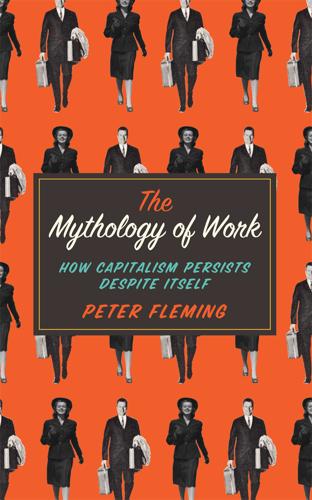
Mythology of Work: How Capitalism Persists Despite Itself
by
Peter Fleming
Published 14 Jun 2015
But when jobs are cast within the bureaucratic and commercialized sphere of hyper-capitalist relations, even brain surgeons sometimes wonder what their worth is, especially when forced to cut costs, meet targets and generate process efficiencies in those public healthcare services that still remain in the West. This is where David Graeber’s (2013) otherwise insightful notion of ‘bullshit jobs’ is problematic. He suggests that there are wide swathes of occupations that are not really necessary since they do not really add anything to the public good (e.g. management consultants, derivative traders, etc.). The problem is, however, that this is the very worldview that informs the neoliberal gaze.
…
Fat and Mean: The Corporate Squeeze of Working Americans and the Myth of Managerial ‘Downsizing’. Martin Kessler Books: New York. Gorz, A. (1989). Critique of Economic Reason. London: Verso. Gorz, A. (1994). Capitalism, Socialism, Ecology. London: Verso. Gorz, A. (2010). Immaterial. London: Seagull Books. Graeber, D. (2013). ‘On the Phenomenon of Bullshit Jobs’. Strike Magazine, August: 7–8. Gregg, M. (2011). Work’s Intimacies. Polity: Cambridge. Guardian, The (2012). ‘Rio+20 Earth Summit: campaigners decry final document’. Available at www.theguardian.com/environment/2012/jun/23/rio-20-earth-summit-document Guardian, The (2013). ‘The US Super-Rich Hit New Wealth Record Five Years After the Crisis’. www.theguardian.com/business/2013/sep/16/us-super-rich-recover-losses-financial-crisis-forbes Guardian, The (2014a).
…
Sinha Group ref1 Becker, G. ref1, ref2, ref3, ref4 Benjamin, W. ref1, ref2 Berardi, F. ref1 Beynon, H. ref1 big government ref1, ref2, ref3 Bikini Kill ref1 biopolitics and biopower ref1, ref2, ref3, ref4, ref5, ref6, ref7, ref8 and uses of illness at work ref1 Bloch, E. ref1 body clock ref1 bonuses ref1, ref2, ref3, ref4 Brabeck, Peter ref1 Branson, Richard ref1 Braverman, H. ref1 Brecht, B. ref1 Breed, L. ref1 British Journal of Psychiatry ref1 British Petroleum (BP), rebranded as ‘Beyond Petroleum’ ref1, ref2, ref3 Brown, Derren ref1 Bukowski, C. ref1, ref2, ref3, ref4 bullshit jobs ref1 bureaucracy ref1, ref2, ref3, ref4, ref5 Buried (Cortés) ref1 Bush, George W. ref1, ref2 business ethics ref1, ref2, ref3, ref4, ref5, ref6 see also corporate social responsibility capitalism ref1, ref2 and class ref1, ref2 and critical theory ref1 and debt ref1 and democracy ref1, ref2 effect on time ref1, ref2, ref3 and engagement of workers ref1, ref2 and freedom of expression ref1 global ref1, ref2, ref3, ref4, ref5 and ideological structures ref1 and rationalization ref1, ref2 shareholder capitalism ref1, ref2, ref3, ref4 and surplus labour ref1 see also neoliberal capitalism Carbon Pollution Reduction Scheme (Australia) ref1 Carr, Allen ref1 Cederström, C. ref1 Certeau, M. de ref1, ref2 Challenger Space Shuttle (1986) ref1 Chomsky, N. ref1 Cipollone, Mrs ref1 circadian rhythms ref1 Clastres, P. ref1 climate change denial ref1 co-optation ref1, ref2, ref3, ref4, ref5 the common ref1, ref2, ref3 communication guerrilla groups ref1 communism ref1, ref2, ref3 construction industry, house building ref1, ref2 consumer society ref1, ref2, ref3 corporate citizenship ref1, ref2, ref3 corporate ideology ref1 and contradiction ref1 and enlightened self-interest ref1 and ‘false truth-telling’ ref1, ref2, ref3 impact of financial crisis ref1 as lie telling ref1 corporate social responsibility (CSR) ref1, ref2, ref3, ref4 in tobacco industry ref1 corporations ref1 ‘creating shared value’ ref1, ref2 and development of capitalist ideology ref1 and work–life balance policies ref1 Cortés, Rodrigo ref1 Crane, A. ref1 Crary, J. ref1, ref2 creditocracy ref1 Critchley, S. ref1 criticism/criticality and ‘sad truths’ ref1 usefulness of ref1 Crozier, M. ref1 The Cube (Natali) ref1 culture management ref1 Daimler ref1 Dardot, P. ref1, ref2 Dawkins, Richard ref1 deaths work-related ref1, ref2 see also suicides debt/indebtedness ref1, ref2, ref3, ref4, ref5, ref6 deformalization ref1 informality and authoritarianism ref1, ref2 Deleuze, G. ref1, ref2, ref3, ref4 biopower ref1, ref2, ref3 on criticism/criticality ref1, ref2 and de-subjectification ref1 and deceptive truths ref1 and illness ref1, ref2, ref3 language ref1, ref2 societies of control ref1, ref2, ref3, ref4, ref5, ref6, ref7, ref8, ref9 democracy and capitalism ref1, ref2 corporations and ref1, ref2 and false truth telling ref1 post-state democratic organizations ref1 self-organized ref1 workplace ref1 desertion ref1, ref2, ref3, ref4, ref5 dialogical reason autobiographical truth telling ref1 critique of ref1 dialectical reason ref1, ref2 dialogical politics at work ref1 dissenting consent ref1 humour ref1 irony ref1, ref2 post-dialogical politics at work ref1 abandonment ref1 absentification ref1 disciplinary power ref1, ref2, ref3, ref4 disposability ref1, ref2, ref3 see also abandonment ideology dissent commodification of ref1 dissenting consent ref1 Edwards, R. ref1 Eggers, D. ref1 email ref1, ref2, ref3, ref4 using outside working hours ref1, ref2, ref3, ref4, ref5 empty labour ref1, ref2 ‘Endies’ (Employed but with No Disposable Income or Savings) ref1 Enron ref1 Erhardt, Moritz ref1 escape ref1, ref2, ref3, ref4, ref5 antinomies of ref1 cinematic visions of ref1, ref2, ref3 negative optics of revolt ref1 see also alcohol consumption; desertion; post-labour strategy; suicide; totality refusal EU Time Directive ref1 exploitation ref1, ref2, ref3, ref4, ref5, ref6 CSR and ref1, ref2, ref3, ref4 and debt ref1, ref2 and escape ref1, ref2 and managerialism ref1, ref2 self-exploitation ref1, ref2, ref3 and self-reliance ref1, ref2, ref3 and subsidization ref1 see also working hours false truth telling ref1 semantic structure of ref1 in tobacco industry ref1, ref2 using the truth to lie ref1 see also dialogical politics; rituals of truth and reconciliation Feldman, R.S. ref1 financial crisis (2008) ref1, ref2, ref3, ref4, ref5, ref6, ref7 impact on corporate ideology ref1 Fisher, M. ref1 Flanagan, B. ref1, ref2, ref3, ref4, ref5 Fleming, P. ref1 flexible labour ref1, ref2, ref3, ref4, ref5 collective self-reliance of workforce ref1, ref2, ref3 Fordism ref1, ref2, ref3, ref4, ref5 and alienation ref1 end of ref1, ref2, ref3, ref4, ref5 Foster, J.B. ref1 Foucault, M. ref1, ref2 aphasia ref1 biopower and biopolitics ref1, ref2, ref3 disciplinary power ref1 parrhesia ref1, ref2, ref3 prison ref1 and regimes of truth ref1 technologies of the self ref1 Foxconn (China) ref1 France Telecom ref1 free time, dangers of ref1, ref2 Freud, S. ref1, ref2, ref3 Friedman, L. ref1 Friedman, M. ref1 ‘Fuck you!’
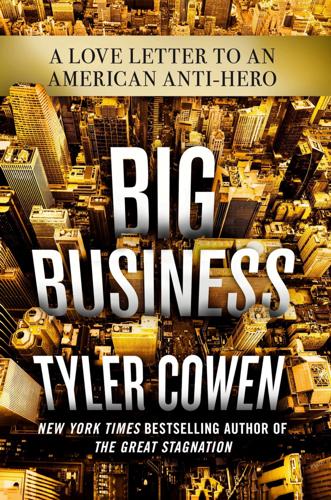
Big Business: A Love Letter to an American Anti-Hero
by
Tyler Cowen
Published 8 Apr 2019
Worker exploitation is one of the oldest charges levied at capitalism, and it persists through the current day. For instance, in a recent Times Literary Supplement review of books about work, Joe Moran summed it up bluntly: “These books are about the misery.” David Graeber, in his recent highly popular book, says it all in the title: Bullshit Jobs: A Theory. Jeffrey Pfeffer, from the Stanford School of Business, calls his latest book Dying for a Paycheck, even though there is established evidence that unemployment is worse for your health than working.1 I’d like to suggest that productive work is one of the most fulfilling sides of our lives.
…
Research Summary. National Bureau of Economic Research, Washington, DC. Gow, Ian D., Steven N. Kaplan, David F. Larcker, and Anastasia A. Zakolyukina. 2016. “CEO Personality and Firm Policies.” NBER Working Paper No. 22435. National Bureau of Economic Research, Washington, DC. Graeber, David. 2018. Bullshit Jobs: A Theory. New York: Simon and Schuster. Graham, John R., Campbell R. Harvey, Jillian Popadak, and Shivaram Rajgopal. 2017. “Corporate Culture: Evidence from the Field.” NBER Working Paper No. 23255. National Bureau of Economic Research, Washington, DC. Gravelle, Jennifer C. 2011. “Corporate Tax Incidence: A Review of Empirical Estimates and Analysis.”
…
Bernstein, Elizabeth best sellers See also publishing Bezos, Jeff See also Amazon Big Brother See privacy Big Data Big Pharma Big Tech disappearance of competition impact on intelligence innovation and loss of privacy and overview Bing Bird, Larry Bitcoin Black, Leon BlackBerry Blackstone blockchain Bloxham, Eleanor Blue Cross/Blue Shield brand loyalty Brexit Brin, David Brooks, Nathan bubbles, financial sector Bullshit Jobs: A Theory (Graeber) Burger King cable TV cable companies cable news Capital One capitalism “creative destruction” and Friedman on logic of market churn and media and public’s view of short-termism venture capitalists workers and young people and See also crony capitalism Capitalism for the People, A (Zingales) Carr, Nicholas Carrier CEOs deaths of increases in salary overview pay for creating value short-termism and skill set China American manufacturing and Apple and facial recognition technology financial innovations financial institutions multinational corporations and productivity retail and tech companies and See also Alibaba Cialdini, Robert Cisco Citibank Citizens United decision See also Supreme Court Civil War Clark, Andrew E.

Ten Lessons for a Post-Pandemic World
by
Fareed Zakaria
Published 5 Oct 2020
Norton, 1963), 358–73. 113 Jetson of the 1960s cartoon: “works three hours a day, three days a week,” per Sarah Ellison, “Reckitt Turns to Jetsons to Launch Detergent Gels,” Wall Street Journal, January 13, 2003; pushing a button, per Hanna-Barbera Wiki, “The Jetsons,” https://hanna-barbera.fandom.com/wiki/The_Jetsons. 113 four-day workweek: Zoe Didali, “As PM Finland’s Marin Could Renew Call for Shorter Work Week,” New Europe, January 2, 2020, https://www.neweurope.eu/article/finnish-pm-marin-calls-for-4-day-week-and-6-hours-working-day-in-the-country/. 114 “bullshit jobs”: David Graeber, Bullshit Jobs: A Theory (New York: Simon & Schuster, 2018). 115 “slaves of time without purpose”: McEwan, Machines Like Me. 116 atoms in the observable universe: David Silver and Demis Hassabis, “AlphaGo: Mastering the Ancient Game of Go with Machine Learning,” Google DeepMind, January 27, 2016, https://ai.googleblog.com/2016/01/alphago-mastering-ancient-game-of-go.html. 116 all fifty-seven games: Kyle Wiggers, “DeepMind’s Agent57 Beats Humans at 57 Classic Atari Games,” Venture Beat, March 31, 2020; Rebecca Jacobson, “Artificial Intelligence Program Teaches Itself to Play Atari Games—And It Can Beat Your High Score,” PBS NewsHour, February 20, 2015. 117 Stuart Russell: Stuart Russell, “3 Principles for Creating Safer AI,” TED2017, https://www.ted.com/talks/stuart_russell_3_principles_for_creating_safer_ai/transcript?
…
You see it in the flexible jobs that characterize the gig economy, such as driving for Uber or DoorDash, where workers can choose their own hours. You see it in the ever-greater number of hours people spend in the office futzing around on social media. And you see it in the rise of what the anthropologist David Graeber colorfully calls “bullshit jobs.” He describes several types, including “box tickers,” who generate lots of paperwork to suggest that things are happening when things aren’t, and “taskmasters,” who manage people who don’t need management. A big problem with technological revolutions, Keynes said, was that with so much of the work increasingly being done by technology, humans would have to find a sense of purpose.

Radical Technologies: The Design of Everyday Life
by
Adam Greenfield
Published 29 May 2017
When we pause to listen for it, the overriding emotion of the internet of things is a melancholy that rolls off of it in waves and sheets. The entire pretext on which it depends is a milieu of continuously shattered attention, of overloaded awareness, and of gaps between people just barely annealed with sensors, APIs and scripts. Implicit in its propositions is a vision of inner states and home lives alike savaged by bullshit jobs, overcranked schedules and long commutes, of intimacy stifled by exhaustion and the incapacity or unwillingness to be emotionally present. The internet of things in all of its manifestations so often seems like an attempt to paper over the voids between us, or slap a quick technical patch on all the places where capital has left us unable to care for one another.
…
But the euphoria soon fades, swept away by the swiftly sobering recognition that there is terribly little chance for a soft landing in any of this, for any one of us. Though we may debate the degree to which choice and conscious authorship are involved in it, it seems important to note that automation is a directional process whose initial stages we’ve already entered. In this respect David Graeber’s empty, signifier-shuffling “bullshit jobs” are a signal from the future. They’re not so much a return as an anticipation of the repressed: the surfacing in the present, and pricing into contemporary ways of doing and being, of the recognition that there simply won’t be enough meaningful work for anyone to do following the eclipse of human judgment.
…
Burt, “Structural Holes and Good Ideas,” American Journal of Sociology, Volume110, Number 2, 2004, pp. 349–99. 43.David Bicknell, “Sloppy Human Error Still Prime Cause of Data Breaches,” Government Computing, June 2, 2016. 44.Mark Blunden, “Enfield Council Uses Robotic ‘Supercomputer’ Instead of Humans to Deliver Frontline Services,” Evening Standard, June 16, 2016. 45.Jun Hongo, “Fully Automated Lettuce Factory to Open in Japan,” Wall Street Journal, August 21, 2015. 46.Jim Tankersley, “Robots Are Hurting Middle Class Workers, and Education Won’t Solve the Problem, Larry Summers Says,” Washington Post, March 3, 2015. 47.Nick Dyer-Witheford, Cyber-Marx: Cycles and Circuits of Struggle in High-technology Capitalism, Urbana: University of Illinois Press, 1999; see also Lawrence H. Summers, “The Inequality Puzzle,” Democracy, Summer 2014 No. 33. 48.David Graeber, “On the Phenomenon of Bullshit Jobs,” STRIKE!, August 17, 2013. 49.Walter Van Trier, “Who Framed ‘Social Dividend’?,” USBIG Discussion Paper No. 26, March 2002. basisinkomen.nl/wp-content/uploads/020223-Walter-VanTrier-8.pdf. See also John Danaher, “Libertarianism and the Basic Income (Part One),” Philosophical Disquisitions, December 17, 2013; Noah Gordon, “The Conservative Case for a Guaranteed Basic Income,” Atlantic, August 2014. 50.Mike Alberti and Kevin C.

All Day Long: A Portrait of Britain at Work
by
Joanna Biggs
Published 8 Apr 2015
In black type on canary yellow, there was a sentence – ‘It’s as if someone were out there making up pointless jobs just for the sake of keeping us all working’ – which came from an article by David Graeber for Strike! magazine about ‘bullshit jobs’. Productive jobs, he argues, have been automated away and replaced by administrative ones which masquerade as service: HR, PR, financial services, ancillary industries like dog-washing and all-night pizza delivery. These are the bullshit jobs that are, you could add, very like T’s. It’s work that looks like work – it fills up a forty-hour week – but that feels pointless to the people doing it and which no one would miss if it disappeared.
…
Pret’s policy on migrant labour was reported on in the Evening Standard; my colleague Paul Myerscough first wrote about Pret’s use of emotional labour in the LRB of 3 January 2013, which was subsequently picked up by the Daily Mail, the Evening Standard and the Independent. The Communication Workers’ Union’s campaign against Payment between Assignment contracts can be seen on their website. David Graeber’s article about ‘bullshit jobs’ is in the 17 August 2013 edition of Strike! Magazine. The FT reported Spad Jo Moore’s comments that 9/11 would be a ‘good day to bury bad news’ and my anthropology of a Spad is drawn from the figures and history in Special Advisers: Who They Are, What They Do and Why They Matter by Ben Yong and Robert Hazell (Hart, 2014) and the Telegraph recorded that Cameron had hung an Emin neon in Number 10 on 20 August 2011.

Code Dependent: Living in the Shadow of AI
by
Madhumita Murgia
Published 20 Mar 2024
I’d seen a beautiful essay by Vauhini Vara on the death of her sister co-written with OpenAI’s GPT software, but nothing it had created on its own stood out. Ted’s view was that LLMs were useful mostly for producing filler text that no one necessarily wants to read or write, tasks that anthropologist David Graeber called ‘bullshit jobs’. AI-generated text was not delightful, but it could perhaps be useful in those certain areas, he conceded. ‘But the fact that LLMs are able to do some of that – that’s not exactly a resounding endorsement of their abilities,’ he said. ‘That’s more a statement about how much bullshit we are required to generate and deal with in our daily lives.’
…
Index Abeleira, Carlos (Charlie) ref1, ref2, ref3, ref4, ref5, ref6, ref7, ref8 Abeleira, Pablo ref1, ref2, ref3, ref4, ref5, ref6 abortion ref1, ref2, ref3, ref4, ref5, ref6, ref7 Abrahamic religions ref1, ref2, ref3 Accenture ref1, ref2 Accredited Social Health Activists (ASHAs) ref1, ref2, ref3 adivasis (indigenous people) ref1 Afghanistan ref1, ref2, ref3 African Americans ref1 over-policing of ref1 pain and ref1 agency AI systems impinging on ref1, ref2 Bandura’s description of ref1, ref2 checklist of guiding questions to help reclaim ref1 China, fight to reclaim within ref1, ref2, ref3 collective agency, AI systems lead to strengthening of ref1 data workers and ref1, ref2, ref3 facial recognition and ref1, ref2, ref3 gig workers and ref1, ref2, ref3 growing wellspring of people fighting to recoup collective ref1, ref2, ref3, ref4 healthcare and ref1, ref2 illusion of ref1 pregnant girls and ref1 proxy agents and ref1, ref2 Ajder, Henry ref1, ref2 Alexa ref1, ref2 alignment, AI ref1 algor-ethics and ref1, ref2 Bletchley Park summit (2023) ref1, ref2, ref3 guiding questions checklist ref1 Rome Call ref1 algorithms agency and see agency algor-ethics and ref1, ref2 autonomy and ref1 bias and ref1, ref2 data ‘colonialism’ and ref1 deepfakes and ref1, ref2, ref3 diagnostic ref1, ref2, ref3, ref4, ref5, ref6, ref7, ref8, ref9 discriminatory and unethical ref1 exam grades and ref1 facial recognition ref1, ref2, ref3, ref4, ref5, ref6 ‘fuck the algorithm’ ref1 GANs and ref1 gig-work and ref1, ref2 hateful content and ref1 military targeting and ref1 organ-allocation and ref1 policing and ref1, ref2, ref3, ref4, ref5 social media ref1, ref2 teenage pregnancy and ref1, ref2, ref3, ref4, ref5, ref6, ref7 training ref1, ref2, ref3 UK government use of ref1 working conditions impact quality of ref1 Xinjiang and ref1, ref2, ref3, ref4 Ali, Altab ref1 Alphabet ref1 al Qaeda ref1 Altab Ali Park ref1 Alzheimer’s disease ref1 Amare, Meareg ref1 Amazon ref1 AI diagnostics and ref1 Alexa ref1, ref2 Echo ref1 warehouse workers ref1, ref2, ref3 Web Services ref1 Amnesty International ref1, ref2, ref3, ref4 Amsterdam predictive policing systems in ref1, ref2, ref3, ref4 Uber ruling in ref1, ref2 Andrade, Norberto ref1 Aneja, Urvashi ref1, ref2, ref3, ref4, ref5, ref6 Anthropic ref1 antitrust law ref1 Apostolic Palace, Rome ref1, ref2 App Drivers and Couriers Union ref1, ref2 Appen ref1 Apple ref1, ref2 Aravind Eye Hospital ref1 Arbusta ref1, ref2 Argent ref1 Argentina app delivery platforms in ref1 data-workers in ref1 teenage pregnancy in ref1, ref2, ref3, ref4 Argo.ai ref1 Arrival (film) ref1, ref2 artificial intelligence (AI) algorithms see algorithms alignment/ethics see alignment, AI data annotation/data-labelling see data annotation/data-labelling deepfakes and see deepfakes facial recognition and see facial recognition future of and see China generative AI see generative AI gig workers and see gig workers growth of ref1 healthcare and see healthcare policing and see policing regulation of see regulation teenage pregnancy and see pregnancy, teenage term ref1 Aslam, Yaseen ref1 AstraZeneca ref1 ‘Attention Is All You Need’ (paper) ref1, ref2 automation ref1, ref2, ref3, ref4 Ayup, Abduweli ref1 Azure software ref1, ref2 Bandura, Albert ref1, ref2 Bard ref1 Bayyah, Sheikh bin ref1 B-corp ref1 Benanti, Paolo ref1, ref2, ref3 Bender, Emily ref1 Berk, Richard ref1 Berlin ref1, ref2, ref3, ref4, ref5 Bezos, Jeff ref1 Bhil tribe ref1, ref2, ref3, ref4, ref5, ref6, ref7 bias ref1, ref2, ref3, ref4, ref5 automation ref1 confirmation ref1 facial recognition technologies and ref1 health technologies and ref1 predictive policing and ref1, ref2 racial see race teenage pregnancy and ref1 Big Tech ref1, ref2, ref3, ref4, ref5, ref6, ref7, ref8 Bing ref1 bioethics ref1 Birhane, Abeba ref1 blacklists ref1, ref2 Black Lives Matter ref1 Black Mirror ref1, ref2 Blem (Ghanaian-British entrepreneur) ref1, ref2 Bletchley Park summit (2023) ref1, ref2, ref3 Bletchley Declaration ref1, ref2 Bloomberg ref1 Bokinni, Yinka ref1 Bolt ref1, ref2 Bouvard, Laurence ref1, ref2 Bravo, Ivan ref1 Bridges, Ed ref1 Bridle, James ref1, ref2, ref3 Budweiser ref1 Buenos Aires ref1, ref2, ref3, ref4, ref5 Bulgaria ref1, ref2 Bulger, Whitey ref1 ‘bullshit jobs’ ref1 Buolamwini, Joy ref1, ref2 Burgess, Rick ref1 al-Busti, Abu al-Fath ref1 Cameroon ref1, ref2 Camofleurs ref1 Can You Forgive Me app ref1 Cant, Callum ref1 Capitol riot, US (2021) ref1 cars, self-driving ref1, ref2, ref3, ref4, ref5, ref6, ref7 Cast Away (film) ref1 Castile, Philando ref1 Catholic Church ref1, ref2, ref3, ref4, ref5, ref6, ref7, ref8, ref9 Cattaneo, Paula ref1 Caucasians ref1, ref2, ref3 CCTV Amsterdam ref1 India ref1, ref2 London ref1 Uganda ref1 Xinjiang ref1 Central St Martins ref1 CGI ref1 Channel 4 ref1 ChatGPT ref1, ref2 ‘ChatGPT Is a Blurry JPEG of the Web’ ref1 deep learning and ref1 generative AI and ref1 language used to describe ref1 lawyers and ref1 origins and launch of ref1 Sama and ref1, ref2, ref3 transformer and ref1 chemical structures ref1 Chiang, Ted ref1 ‘ChatGPT Is a Blurry JPEG of the Web’ ref1 ‘Story of Your Life’ ref1 The Lifecycle of Software Objects ref1 Chien-Shiung Wu ref1 China ref1 Covid-19 and ref1, ref2, ref3 deepfakes in ref1 dissidents in ref1, ref2 facial recognition in ref1, ref2, ref3, ref4, ref5, ref6, ref7, ref8 gig workers in ref1, ref2, ref3, ref4 Integrated Joint Operations Platform (IJOP) ref1, ref2 One Card System ref1 Tiananmen Square massacre (1989) ref1, ref2, ref3, ref4 video game artists ref1 Xinjiang, Uyghur Muslims in ref1, ref2, ref3 China Electronics Technology Group Corporation (CETC) ref1 Chinchpada, India, healthcare AI in ref1 Chinchpada Christian Hospital, India ref1 Chinese Communist Party ref1, ref2 CIA ref1 Claude ref1 Clearview AI ref1 Coca Cola ref1 collective bargaining ref1 colonialism ref1, ref2, ref3, ref4, ref5 data colonialism ref1, ref2, ref3, ref4, ref5, ref6, ref7, ref8, ref9, ref10 divide and rule and ref1 gig workers and ref1 resource extraction ref1 technology companies as monopolistic quasi-states ref1 Communications Decency Act, Section ref1 ref1 COMPAS ref1, ref2 Conin ref1, ref2, ref3, ref4 content moderators ref1, ref2, ref3, ref4, ref5, ref6 cookies ref1 Couldry, Nick: The Costs of Connection ref1 Covid-19 ref1, ref2, ref3, ref4, ref5, ref6 AI labelling and ref1 China and ref1 diagnostic algorithms ref1, ref2 exam results during ref1 social media algorithms and ref1 CPI Libertad ref1 Crawford, Kate ref1 creativity ref1, ref2, ref3, ref4 credit-rating agencies ref1 Crider, Cori ref1 Crime Anticipation System (CAS) ref1 culture of secrecy/climate of fear ref1 Curling, Rosa ref1 CV Dazzle ref1 DaimlerChrysler ref1 Dall-E ref1, ref2 Dalrymple, William: The Anarchy ref1 Daoud, Abdullah ref1, ref2 Daoud, Ghazwan ref1, ref2, ref3, ref4, ref5 Daoud, Hiba Hatem ref1, ref2, ref3, ref4, ref5, ref6, ref7 Dark, Martha ref1 Dasgupta, Rana ref1 Dashcam For Your Bike ref1 data annotation/data-labelling ref1 Humans in the Loop ref1, ref2, ref3, ref4 Sama ref1, ref2, ref3, ref4, ref5, ref6, ref7 wages ref1, ref2, ref3, ref4, ref5, ref6 workin conditions impact quality of algorithms ref1 data brokers ref1, ref2 data colonialism ref1, ref2, ref3, ref4, ref5, ref6, ref7, ref8, ref9, ref10 Dazzle Club ref1 De Moeder Is De Sleutel (The Mother Is the Key) ref1 deathworlds ref1, ref2 Decentraland ref1 ‘#DeclineNow’ ref1 deepfakes ref1, ref2, ref3, ref4, ref5 Can You Forgive Me app ref1 data colonialism and ref1 DeepNude ref1 DreamTime ref1 GANs and ref1 Goldberg and fighting ref1, ref2 Martin and ref1, ref2, ref3, ref4, ref5, ref6, ref7 metaverse ref1 Mort and see Mort, Helen nudes-for-hire services ref1 Online Safety Bill and ref1 origins and rise of ref1 PimEyes ref1 regulatory change ref1, ref2, ref3, ref4, ref5, ref6, ref7, ref8, ref9, ref10 term ref1 WITNESS and ref1 deep learning ref1, ref2, ref3 DeepMind ref1, ref2, ref3, ref4 DeepNude ref1 Deliveroo ref1, ref2, ref3, ref4 Department for Work and Pensions ref1 Department of Defense ref1, ref2 diffuse policing ref1 digital colonialism ref1, ref2 Digital Geneva Convention (2017) ref1 Disney ref1 dissidents, Chinese ref1, ref2 divide et impera (divide and rule) ref1 domestic violence ref1, ref2, ref3 DoorDash ref1, ref2, ref3 Douglass, Frederick ref1 DreamTime ref1 driver profiles ref1 Driver’s Seat Cooperative ref1 ‘driving while black’ ref1 drones ref1, ref2, ref3, ref4 Dryhurst, Mathew ref1 East India Company ref1, ref2 el chineo (gang rape) ref1 Ele.me ref1 Electronic Frontier Foundation ref1 Emmanuel Trust ref1 Entregadores Anti-fascistas (Anti-Fascist Couriers) ref1 ethics, AI ref1, ref2, ref3 alignment, AI ref1 algor-ethics and ref1, ref2 Bletchley Park summit (2023) ref1, ref2, ref3 guiding questions checklist ref1 ‘humanist’ ref1 Rome Call ref1 Ethiopia ref1, ref2, ref3 Eubanks, Virginia ref1 European Union ref1, ref2, ref3, ref4, ref5 Artificial Intelligence Act, draft ref1 exam grades ref1 Experian ref1 exports, AI Surveillance ref1, ref2 Eyeota ref1 fabricated sentences ref1 Face++ ref1 Facebook content moderators and ref1, ref2 deepfakes and ref1, ref2, ref3, ref4, ref5 gig workers and ref1 metaverse and ref1, ref2 ‘move fast and break things’ motto ref1 NDAs and ref1, ref2 online hatred and ref1 Sama and ref1, ref2, ref3, ref4 see also Meta facial recognition ref1, ref2, ref3, ref4 Camofleurs and ref1 CCTV and ref1 China and ref1, ref2, ref3, ref4, ref5, ref6, ref7, ref8 confirmation bias and ref1 databases of faces ref1 Dazzle Club/dazzle camouflage techniques and ref1 exporting technologies ref1, ref2 gig workers and ref1, ref2, ref3, ref4 origins of ref1 racial bias and ref1, ref2, ref3, ref4, ref5 regulating ref1 super-recognizers ref1 Fair Trials ref1, ref2 Fallujah, Iraq ref1, ref2 Farrar, James ref1, ref2 Financial Times ref1, ref2, ref3 Floyd, George ref1 forgiveness ref1, ref2, ref3 Forster, E.
…
.: ‘The Machine Stops’ ref1 Fortnite ref1 Foxglove ref1 Framestore ref1 Francis, Pope ref1, ref2 fraudulent activity benefits ref1 gig workers and ref1, ref2, ref3 free will ref1, ref2 Freedom of Information requests ref1, ref2, ref3 ‘Fuck the algorithm’ ref1 Fussey, Pete ref1 Galeano, Eduardo ref1 gang rape ref1, ref2 gang violence ref1, ref2, ref3, ref4 Gebru, Timnit ref1, ref2, ref3 Generative Adversarial Networks (GANs) ref1 generative AI ref1, ref2, ref3, ref4, ref5, ref6, ref7, ref8, ref9, ref10 AI alignment and ref1, ref2, ref3 ChatGPT see ChatGPT creativity and ref1, ref2, ref3, ref4 deepfakes and ref1, ref2, ref3 GPT (Generative Pre-trained Transformer) ref1, ref2, ref3, ref4 job losses and ref1 ‘The Machine Stops’ and ref1 Georgetown University ref1 gig work ref1, ref2, ref3, ref4, ref5 Amsterdam court Uber ruling ref1 autonomy and ref1 collective bargaining and ref1 colonialism and ref1, ref2, ref3 #DeclineNow’ hashtag ref1 driver profiles ref1 facial recognition technologies ref1, ref2, ref3, ref4 fraudulent activity and ref1, ref2, ref3, ref4 ‘going Karura’ ref1 ‘hiddenness’ of algorithmic management and ref1 job allocation algorithm ref1, ref2, ref3, ref4, ref5, ref6 location-checking ref1 migrants and ref1 ‘no-fly’ zones ref1 race and ref1 resistance movement ref1 ‘slaveroo’ ref1 ‘therapy services’ ref1 UberCheats ref1, ref2, ref3 UberEats ref1, ref2 UK Supreme Court ruling ref1 unions and ref1, ref2, ref3 vocabulary to describe AI-driven work ref1 wages ref1, ref2, ref3, ref4, ref5, ref6, ref7, ref8, ref9, ref10, ref11 work systems built to keep drivers apart or turn workers’ lives into games ref1, ref2 Gil, Dario ref1 GitHub ref1 ‘give work, not aid’ ref1 Glastonbury Festival ref1 Glovo ref1 Gojek ref1 ‘going Karura’ ref1 Goldberg, Carrie ref1 golem (inanimate humanoid) ref1 Gonzalez, Wendy ref1 Google ref1 advertising and ref1 AI alignment and ref1 AI diagnostics and ref1, ref2, ref3 Chrome ref1 deepfakes and ref1, ref2, ref3, ref4 DeepMind ref1, ref2, ref3, ref4 driverless cars and ref1 Imagen AI models ref1 Maps ref1, ref2, ref3 Reverse Image ref1 Sama ref1 Search ref1, ref2, ref3, ref4, ref5 Transformer model and ref1 Translate ref1, ref2, ref3, ref4 Gordon’s Wine Bar London ref1 GPT (Generative Pre-trained Transformer) ref1, ref2, ref3, ref4 GPT-4 ref1 Graeber, David ref1 Granary Square, London ref1, ref2 ‘graveyard of pilots’ ref1 Greater Manchester Coalition of Disabled People ref1 Groenendaal, Eline ref1 Guantanamo Bay, political prisoners in ref1 Guardian ref1 Gucci ref1 guiding questions checklist ref1 Gulu ref1 Gumnishka, Iva ref1, ref2, ref3, ref4 Gutiarraz, Norma ref1, ref2, ref3, ref4, ref5 hallucination problem ref1, ref2, ref3 Halsema, Femke ref1, ref2 Hanks, Tom ref1, ref2 Hart, Anna ref1 Hassabis, Demis ref1 Harvey, Adam ref1 Have I Been Trained ref1 healthcare/diagnostics Accredited Social Health Activists (ASHAs) ref1, ref2, ref3 bias in ref1 Covid-19 and ref1, ref2 digital colonialism and ref1 ‘graveyard of pilots’ ref1 heart attacks and ref1, ref2 India and ref1 malaria and ref1 Optum ref1 pain, African Americans and ref1 qTrack ref1, ref2, ref3 Qure.ai ref1, ref2, ref3, ref4 qXR ref1 radiologists ref1, ref2, ref3, ref4, ref5, ref6 Tezpur ref1 tuberculosis ref1, ref2, ref3 without trained doctors ref1 X-ray screening and ref1, ref2, ref3, ref4, ref5, ref6, ref7, ref8, ref9, ref10 heart attacks ref1, ref2 Herndon, Holly ref1 Het Parool ref1, ref2 ‘hiddenness’ of algorithmic management ref1 Hikvision ref1, ref2 Hinton, Geoffrey ref1 Hive Micro ref1 Home Office ref1, ref2, ref3 Hong Kong ref1, ref2, ref3, ref4, ref5 Horizon Worlds ref1 Hornig, Jess ref1 Horus Foundation ref1 Huawei ref1, ref2, ref3 Hui Muslims ref1 Human Rights Watch ref1, ref2, ref3, ref4 ‘humanist’ AI ethics ref1 Humans in the Loop ref1, ref2, ref3, ref4 Hyderabad, India ref1 IBM ref1, ref2, ref3, ref4 Iftimie, Alexandru ref1, ref2, ref3, ref4, ref5 IJburg, Amsterdam ref1 Imagen AI models ref1 iMerit ref1 India ref1, ref2, ref3, ref4, ref5, ref6, ref7, ref8, ref9 facial recognition in ref1, ref2, ref3 healthcare in ref1, ref2, ref3 Industrial Light and Magic ref1 Information Commissioner’s Office ref1 Instacart ref1, ref2 Instagram ref1, ref2 Clearview AI and ref1 content moderators ref1, ref2, ref3, ref4 deepfakes and ref1, ref2, ref3 Integrated Joint Operations Platform (IJOP) ref1, ref2 iPhone ref1 IRA ref1 Iradi, Carina ref1 Iranian coup (1953) ref1 Islam ref1, ref2, ref3, ref4, ref5 Israel ref1, ref2, ref3 Italian government ref1 Jaber, Faisal bin Ali ref1 Jainabai ref1 Janah, Leila ref1, ref2, ref3 Jay Gould, Stephen ref1 Jewish faith ref1, ref2, ref3, ref4 Jiang, Mr ref1 Jim Crow era ref1 jobs application ref1, ref2, ref3 ‘bullshit jobs’ ref1 data annotation and data-labelling ref1 gig work allocation ref1, ref2, ref3, ref4, ref5, ref6 losses ref1, ref2, ref3 Johannesburg ref1, ref2 Johnny Depp–Amber Heard trial (2022) ref1 Jones, Llion ref1 Joske, Alex ref1 Julian-Borchak Williams, Robert ref1 Juncosa, Maripi ref1 Kafka, Franz ref1, ref2, ref3, ref4 Kaiser, Lukasz ref1 Kampala, Uganda ref1, ref2, ref3 Kellgren & Lawrence classification system. ref1 Kelly, John ref1 Kibera, Nairobi ref1 Kinzer, Stephen: All the Shah’s Men ref1 Knights League ref1 Koli, Ian ref1, ref2, ref3, ref4, ref5, ref6, ref7, ref8, ref9, ref10 Kolkata, India ref1 Koning, Anouk de ref1 Laan, Eberhard van der ref1 labour unions ref1, ref2, ref3, ref4, ref5, ref6 La Fors, Karolina ref1 LAION-5B ref1 Lanata, Jorge ref1 Lapetus Solutions ref1 large language model (LLM) ref1, ref2, ref3 Lawrence, John ref1 Leigh, Manchester ref1 Lensa ref1 Leon ref1 life expectancy ref1 Limited Liability Corporations ref1 LinkedIn ref1 liver transplant ref1 Loew, Rabbi ref1 London delivery apps in ref1, ref2 facial recognition in ref1, ref2, ref3, ref4 riots (2011) ref1 Underground terrorist attacks (2001) and (2005) ref1 Louis Vuitton ref1 Lyft ref1, ref2 McGlynn, Clare ref1, ref2 machine learning advertising and ref1 data annotation and ref1 data colonialism and ref1 gig workers and ref1, ref2, ref3 healthcare and ref1, ref2, ref3 predictive policing and. ref1, ref2, ref3, ref4 rise of ref1 teenage pregnancy and ref1, ref2, ref3 Mahmoud, Ala Shaker ref1 Majeed, Amara ref1, ref2 malaria ref1 Manchester Metropolitan University ref1 marginalized people ref1, ref2, ref3, ref4, ref5, ref6, ref7, ref8, ref9 Martin, Noelle ref1, ref2, ref3, ref4, ref5, ref6, ref7 Masood, S.
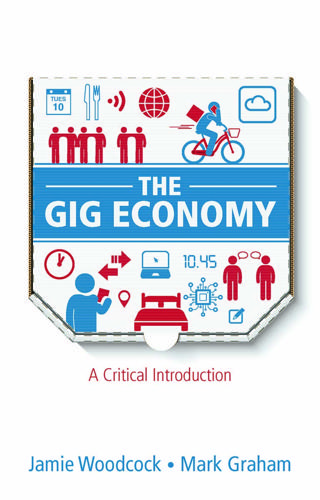
The Gig Economy: A Critical Introduction
by
Jamie Woodcock
and
Mark Graham
Published 17 Jan 2020
Similarly, another worker explained that they ‘wanted to work outside and with a bicycle, because it’s my passion working with a bicycle’. For younger workers, the gig economy offers the potential – and it is important to stress that this is a potential, as we discuss further later in the book – for different ways of working. This is particularly important considering the rise of what David Graeber (2018) has called ‘bullshit jobs’, forms of work that appear to be meaningless busywork. The desire to escape from these kinds of jobs provides a ready supply of labour power to be put to work in new ways. In low- and middle-income countries, even relatively highskilled workers have tended to be quite constrained by the boundaries of their local labour markets.
…
Available at: https://techcrunch.com/2015/03/03/in-the-age-of-disintermediation-the-battle-is-all-for-the-customer-interface/ Goos, M. and Manning, A. (2007) Lousy and lovely jobs: The rising polarization of work in Britain. Review of Economics and Statistics, 89(1): 118–33. Graeber, D. (2018) Bullshit Jobs: A Theory. London: Allen Lane. Graham, M. and Anwar, M.A. (2018) Digital labour. In J. Ash, R. Kitchin and A. Leszczynski (eds.) Digital Geographies. London: Sage, pp. 177–87. Graham, M. and Anwar, M.A. (2019) The global gig economy: Towards a planetary labour market? First Monday, 24(4). doi.org/10.5210/fm.v24i4.9913.
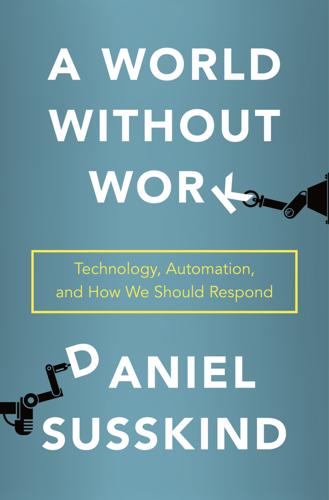
A World Without Work: Technology, Automation, and How We Should Respond
by
Daniel Susskind
Published 14 Jan 2020
In the United States, almost 70 percent of workers are either “not engaged” in or “actively disengaged” from their work, while only 50 percent say they “get a sense of identity from their job.”32 In the UK, almost 40 percent of people think their work does not make a meaningful contribution to the world.33 In the words of the sociologist David Graeber, many people today find themselves trapped in “bullshit jobs.”34 Finally, even for those who are fortunate and privileged enough to find their jobs meaningful, it does not follow that they would want to work if they did not have to. Take the French. They attach more importance to their work than many other nationalities. Yet, at the same time, they wish to—and do—devote less time to it than people in most other countries.35 At times, I wonder whether the academics and commentators who write fearfully about a world with less work are just mistakenly projecting the personal enjoyment they take from their jobs onto the experience of everyone else.
…
THE OPIUM OF THE PEOPLE There are, then, two very different views of the relationship between work and meaning. There are those who imagine that there is an important connection between the two, who see work as a way not only of distributing income in society but of sharing out meaning as well. Reading the downbeat accounts of “bullshit jobs” and miserable employment, they are likely to instinctively feel that things need not be that way, that with the proper changes even unpleasant work could be made fulfilling, too. Then there are those who have the reverse inclination, who question any link between work and meaning, and are likely to see any unhappiness or disillusion with work as confirmation of their beliefs.
…
Gallup, “State of the American Workplace” (2017); Pew Research Center, “How Americans View Their Jobs,” 6 October 2016, http://www.pewsocialtrends.org/2016/10/06/3-how-americans-view-their-jobs/ (accessed 24 April 2018). 33. Will Dahlgreen, “37% of British Workers Think Their Jobs Are Meaningless,” YouGov UK, 12 August 2015. 34. David Graeber, “On the Phenomenon of Bullshit Jobs: A Work Rant,” STRIKE! magazine, August 2013. 35. Pierre-Michel Menger calls this “the French Paradox.” He set it out in a presentation titled “What Is Work Worth (in France)?,” prepared for the “Work in the Future” symposium, 6 February 2018, organized by Robert Skidelsky. 36. Keynes, Essays in Persuasion, p. 368. 37.

Marx at the Arcade: Consoles, Controllers, and Class Struggle
by
Jamie Woodcock
Published 17 Jun 2019
Although, amusingly, it later dived as investors realized the company itself would not profit that much from the game, given it was developed by Niantic (and draws on data from Google, who also incubated the company). Presumably, investors had not checked this in advance. There is also evidence that the refusal of work in relation to videogames is going beyond work avoidance in the workplace. David Graeber has observed that many people in the Global North are now working what they call “bullshit jobs.”36 As Jane McGonigal has explained: “Games provide a sense of waking in the morning with one goal: I’m trying to improve this skill, teammates are counting on me, and my online community is relying on me. There is a routine and daily progress that does a good job at replacing traditional work.”37 There is now evidence that in the US, a segment of young men are dropping out of the labor force to play videogames.
…
“It’s Like the Gold Rush: The Lives and Careers of Professional Video Game Streamers on Twitch.tv,” Information, Communication and Society 22, no. 3 (2017): 336–51. 33Jason Schreier, “Sid Meier: The Father of Civilization,” Kotaku, June 26, 2013, https://kotaku.com/the-father-of-civilization-584568276. 34Dyer-Witheford and de Peuter, Games of Empire, 28. 35Katie Sola, “‘Pokémon GO’ Poll Shows 69% of Users Play at Work,” Forbes, July 19, 2016. 36David Graeber, Bullshit Jobs: A Theory (London: Penguin, 2018). 37Quoted in Quoctrung Bui, “Why Some Men Don’t Work: Video Games Have Gotten Really Good,” New York Times, July 3, 2017, www.nytimes.com/2017/07/03/upshot/why-some-men-dont-work-video-games-have-gotten-really-good.html. 38Bui, “Why Some Men Don’t Work.” 39Johan Huizinga, Homo Ludens: A Study of the Play-Element in Culture (Kettering, OH: Angelico Press, 2006), 12.
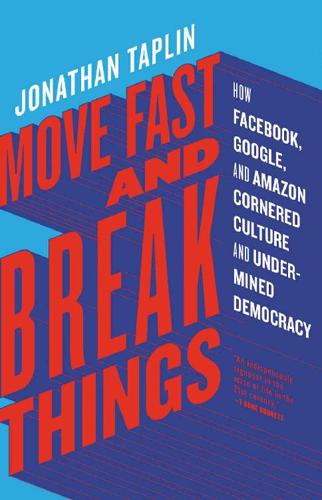
Move Fast and Break Things: How Facebook, Google, and Amazon Cornered Culture and Undermined Democracy
by
Jonathan Taplin
Published 17 Apr 2017
If Frey and Osborne are right, and 47 percent of jobs may be automated in the next two decades, then we face one of two possible futures. The dystopian future of mass unemployment and psychological alienation leading to deep social unrest is one we have already seen in Blade Runner. The only present remedy is to create millions of low-wage “bullshit jobs”—the writer David Graeber’s term. Graeber notes, “Huge swaths of people, in Europe and North America in particular, spend their entire working lives performing tasks they believe to be unnecessary. The moral and spiritual damage that comes from this situation is profound. It is a scar across our collective soul.
…
Letter to the Editor, Wall Street Journal, January 24, 2014, www.wsj.com/news/articles/SB10001424052702304549504579316913982034286. David Graeber, The Utopia of Rules: On Technology, Stupidity, and the Secret Joys of Bureaucracy (London: Melville House, 2015). This is a funny, biting chronicle of the world of “bullshit jobs.” Chapter Eleven: What It Means to Be Human Nir Eyal, Hooked: How to Build Habit-Forming Products (New York: Portfolio, 2014). Eyal takes B. F. Skinner’s conditioning model to its logical conclusion. Donald Trump’s fake Twitter followers can be found at fakers.statuspeople.com/realdonaldtrump.

A Primer on Utopian Philosophy: An Introduction to the Work of Ernst Bloch
by
Jonathan Greenaway
Published 29 Mar 2024
The reasons for this are both external and internal — after all, capitalist realism is as much an economic reality as it is global Weltanschauung, a structure of feeling that both mediates political and social externalities as at the same time it shapes us existentially and psychologically as subjects. Within ourselves we have not just conscious drives towards a future but also unconscious drives. These unspoken desires were the ground of the New, from the politics of a mass movement to the fleeting dreams of someone trapped in what David Graeber calls a bullshit job. The psychiatrist and phenomenologist, Thomas Fuchs, pointed out a few other common phenomena which fit Bloch’s conception of the ‘not yet conscious’ ranging from words and names being on the tip of one’s tongue, to inchoate impulses and desires which have yet to find full expression. Bloch understood the ‘not yet conscious’ as a historical force but also as a psychological truth about individuals.

Like, Comment, Subscribe: Inside YouTube's Chaotic Rise to World Domination
by
Mark Bergen
Published 5 Sep 2022
GO TO NOTE REFERENCE IN TEXT said in a statement: Claire Cain Miller, “Google Appoints Its Most Senior Woman to Run YouTube,” The New York Times, February 5, 2014, https://bits.blogs.nytimes.com/2014/02/05/google-appoints-its-most-senior-woman-to-run-youtube/. GO TO NOTE REFERENCE IN TEXT Slide five showed: Doerr, Measure What Matters, 166. GO TO NOTE REFERENCE IN TEXT Chapter 18: Down the Tubes an anthropologist: David Graeber, “On the Phenomenon of Bullshit Jobs,” Atlas of Places, 2013, https://www.atlasofplaces.com/essays/on-the-phenomenon-of-bullshit-jobs/. GO TO NOTE REFERENCE IN TEXT her co-worker said: Alex Morris, “When Google Walked,” New York, February 5, 2019, https://nymag.com/intelligencer/2019/02/can-the-google-walkout-bring-about-change-at-tech-companies.html. GO TO NOTE REFERENCE IN TEXT she signed off: Claire Stapleton, “Down the ’Tube: 10.3.2014,” Tiny Letter, October 3, 2014, http://tinyletter.com/clairest/letters/down-the-tube-10-3-2014.
…
In her first week YouTube sent her to Paris to meet engineers scripting its recommendation system. These coders discussed the various signals that went into the algorithm, but they didn’t answer her basic question about her gig. A colleague from London did, obliquely, with a link sent over company chat. Stapleton clicked. “On the Phenomenon of Bullshit Jobs,” a screed from an anthropologist: It’s as if someone out there were making up pointless jobs just for the sake of keeping us all working. And here, precisely, lies the mystery . . . Hell is a collection of individuals who are spending the bulk of their time working on a task they don’t like and are not especially good at.
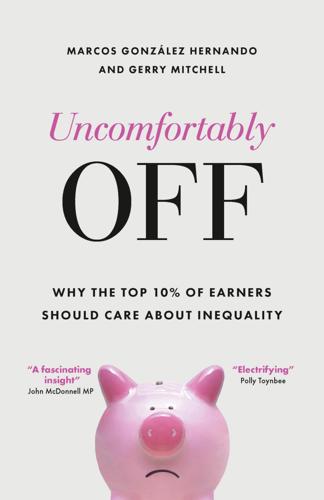
Uncomfortably Off: Why the Top 10% of Earners Should Care About Inequality
by
Marcos González Hernando
and
Gerry Mitchell
Published 23 May 2023
Susannah is a highly educated, highachieving woman at the top of her career working in a senior position in banking in one of the financial centres of the world. And yet she doesn’t think her work makes a massive difference to the lives of others. Would we be right to disagree, considering she is the one actually doing the job? Anthropologist David Graeber famously argued in his 2018 book Bullshit Jobs that an increasing number of employees do not believe society would be worse off if their jobs did not exist. This applied even to the private sector (35% of its employees in the surveys he cites), which is supposed to be driven by efficiency and where useless jobs would supposedly be driven out by the bottom line.24 Only a few respondents in the private sector conveyed a sense of purpose in or motivation for their work beyond material gain and the narrow, direct satisfaction of the needs of their clients.
…
London: Joseph Rowntree Foundation. www.jrf.org.uk/report/low-income-voters-ukgeneral-elections-1987-2017 Gov.uk (2015) PM speech on opportunity. David Cameron discusses plans to help working families and extend opportunities to all. 22 June. www.gov.uk/government/speeches/pm-speechon-opportunity Graeber, D. (2018) Bullshit jobs: A theory. London: Simon & Schuster. 214 References Graham, H., de Bell, S., Hanley, N., Jarvis, S. and White, P. (2019) Willingness to pay for policies to reduce future deaths from climate change: evidence from a British survey. Public Health, 174, 110–17. Green, D. (2016) How change happens.
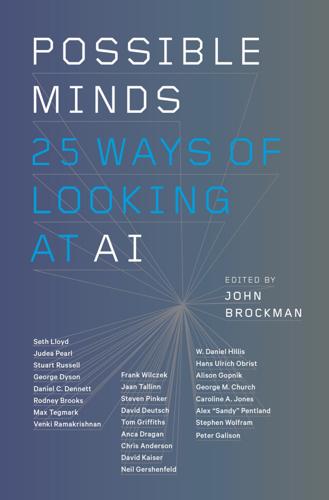
Possible Minds: Twenty-Five Ways of Looking at AI
by
John Brockman
Published 19 Feb 2019
Sadly, Keynes’s predictions did not come true. Although productivity did indeed increase, the system—possibly inherent in a market economy—did not result in humans working much shorter hours. Rather, what happened is what the anthropologist and anarchist David Graeber describes as the growth of “bullshit jobs.”* While jobs that produce essentials like food, shelter, and goods have been largely automated away, we have seen an enormous expansion of sectors like corporate law, academic and health administration (as opposed to actual teaching, research, and the practice of medicine), “human resources,” and public relations, not to mention new industries like financial services and telemarketing and ancillary industries in the so-called gig economy that serve those who are too busy doing all that additional work.
…
* Warren Weaver, “Recent Contributions to the Mathematical Theory of Communication,” in Claude Shannon and Warren Weaver, The Mathematical Theory of Communication (Urbana: University of Illinois Press, 1949), 8 (emphasis in original). Shannon’s 1948 papers were republished in the same volume. * Matthew Arnold, Culture and Anarchy, ed. Jane Garnett (Oxford, UK: Oxford University Press, 2006). * The Human Use of Human Beings (Boston: Houghton Mifflin, 1954), 17–18. * https://strikemag.org/bullshit-jobs. * See, for example, Dennett’s From Bacteria to Bach and Back: The Evolution of Minds (New York: W. W. Norton, 2017). * https://givingpledge.org/About.aspx. * Brenden M. Lake, Ruslan Salakhutdinov, and Joshua B. Tenenbaum, “Human-Level Concept Learning Through Probabilistic Program Induction,” Science 350, no. 6266 (2015): 1332–38
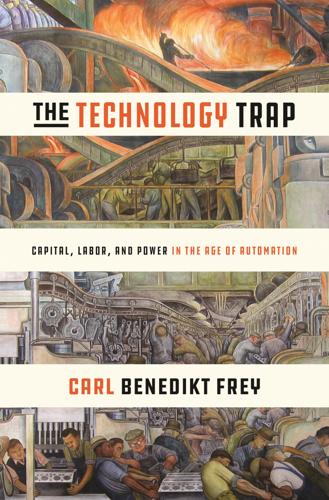
The Technology Trap: Capital, Labor, and Power in the Age of Automation
by
Carl Benedikt Frey
Published 17 Jun 2019
Yet most people find fulfillment and meaning in their work, whereas time-use studies show that the unskilled, who have seen their prospects in the labor market deteriorate, spend much of their time in front of the television, despite many studies showing that there is a negative correlation between television consumption and individual well-being.35 Contrary to the anthropologist David Graeber’s witty essay on “bullshit jobs,” in which he claims that most people spend their working lives doing work they perceive to be meaningless, large-scale survey evidence shows the exact opposite.36 And a wide range of studies across many countries and periods of time has consistently shown that people who work are happier than those who do not.37 As Ian Goldin puts it, “Individuals gain not only income, but meaning, status, skills, networks and friendships through work.
…
On UBI versus the welfare state, see A. Goolsbee, 2018, “Public Policy in an AI Economy” (Working Paper 24653, National Bureau of Economic Research, Cambridge, MA). 35. On television and well-being, see B. S. Frey, 2008, Happiness: A Revolution in Economics (Cambridge, MA: MIT Press), chapter 9. 36. D. Graeber, 2018, Bullshit Jobs: A Theory (New York: Simon & Schuster). For survey evidence showing that people find meaning in their jobs, see R. Dur and M. van Lent, 2018, “Socially Useless Jobs” (Discussion Paper 18-034/VII, Amsterdam: Tinbergen Institute). 37. On happiness and unemployment, see B. S. Frey, 2008, Happiness, chapter 4. 38.
…
The Rise and Fall of American Growth: The U.S. Standard of Living Since the Civil War. Princeton, NJ: Princeton University Press. Gould, E. D., B. A. Weinberg, and D. B. Mustard. 2002. “Crime Rates and Local Labor Market Opportunities in the United States: 1979–1997.” Review of Economics and Statistics 84 (1): 45–61. Graeber, D. 2018. Bullshit Jobs: A Theory. New York: Simon & Schuster. Graetz, G., and G. Michaels. Forthcoming. “Robots at Work.” Review of Economics and Statistics. Gramlich, J. 2017. “Most Americans Would Favor Policies to Limit Job and Wage Losses Caused by Automation.” Pew Research Center. http://www.pewresearch.org/fact-tank/2017/10/09/most-americans-would-favor-policies-to-limit-job-and-wage-losses-caused-by-automation/.

Artificial Whiteness
by
Yarden Katz
Ironically, in the same piece Boden called for funds to be devoted to “combatting the ignorance and sensationalism that attends AI today” (75). For a discussion of the proliferation, not reduction, of administrative jobs in capitalist societies and the connection to Keynes’s prediction of a diminished work week, see David Graeber, “On the Phenomenon of Bullshit Jobs: A Work Rant,” Strike Magazine 3 (August 2013). 35. Simon won great acclaim in both AI and economics. Within the latter he is often presented as a “heretical” thinker, despite winning the field’s coveted Swedish National Bank’s Prize in Economics. See Leonard Silk, “Nobel Winner’s Heretical Views,” New York Times, November 9, 1978.
…
Reality at the MIT Media Lab.” Chronicle of Higher Education, September 11, 2019. Gonzaléz, Jacinta. Interview by author, November 13, 2018. Gossett, Thomas F. Race: The History of an Idea in America. Race and American Culture. 1963. Oxford: Oxford University Press, 1997. Graeber, David. “On the Phenomenon of Bullshit Jobs: A Work Rant.” Strike Magazine 3 (August 2013). ________. Toward An Anthropological Theory of Value: The False Coin of Our Own Dreams. New York: Palgrave, 2001. GRAIN and Rede Social de Justiça e Direitos Humanos. Harvard’s Billion-Dollar Farmland Fiasco. September 2018. Grande, Sandy. “Refusing the University.”
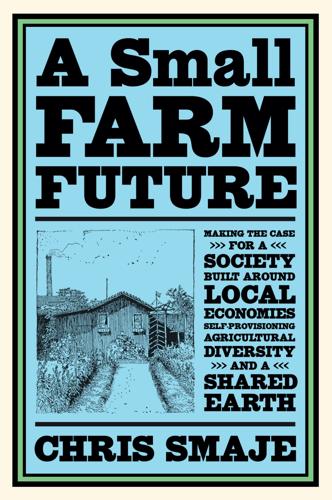
A Small Farm Future: Making the Case for a Society Built Around Local Economies, Self-Provisioning, Agricultural Diversity and a Shared Earth
by
Chris Smaje
Published 14 Aug 2020
Even as this grid provides some of us with levels of material comfort unknown to most people in the past and to ever new ways of creating ourselves aesthetically, it seems to deny us ways to create ourselves materially and spiritually – no land to grow food for ourselves, no capacity to maintain or mend the machines upon which we increasingly rely and that come to us wreathed in layers of electronic sophistication that might as well be magic, no autonomy of action in the face of policies and procedures laid down minutely by the organs of state power. This modernist phenomenon of well-paid and materially comfortable but meaningless and alienating work is increasingly apparent, and instead of labouring the point I’ll simply mention the resonant titles of two recent books that explore the malaise: Bullshit Jobs and The Case for Working with Your Hands.141 It’s tempting to dismiss this as over-privileged moaning, what’s sometimes sardonically described as a first-world problem. But I think we should take it more seriously, if only because first-world problems usually become whole-world problems. The problem is a whole-world one for two reasons.
…
‘Tropical Forests Were the Primary Sources of New Agricultural Land in the 1980s and 1990s,’ PNAS 107(38): 16732–37. Gosho, Merrill, et al. 1984. ‘The Sperm Whale,’ Marine Fisheries Review 46:54–64. Graeber, David. 2011. Debt: The First 5,000 Years. New York: Melville House. _______. 2018. Bullshit Jobs: A Theory. London: Allen Lane. GRAIN. 2014. Hungry for Land: Small Farmers Feed the World with Less Than a Quarter of All Farmland. Barcelona: Grain. Grime, J. Philip. 2001. Plant Strategies, Vegetation Processes, and Ecosystem Properties. Chichester: John Wiley. Grime, J. Philp, and Simon Pierce. 2012.

This Is Not a Drill: An Extinction Rebellion Handbook
by
Extinction Rebellion
Published 12 Jun 2019
Of course, that’s a huge if, especially when – as in the UK – rough sleeping and dependence on food banks have already been rising for years. Yet this is what a surrender looks like: it’s about how much of the organized activity of a society can be decommissioned, not by 2050 or 2030, or even 2025, but as soon as possible. The fact that David Graeber found out when he wrote about ‘bullshit jobs’ – that much of our activity shown up as GDP is widely recognized as pointless, including by those carrying it out – is beneficial. To negotiate a surrender, you need a credible threat – and this is where the movement that began in London in November 2018 might look again at its strange twin across the Channel.

Virtual Competition
by
Ariel Ezrachi
and
Maurice E. Stucke
Published 30 Nov 2016
The rule of reason also “varies in focus and detail depending on the nature of the agreement and market circumstances.” Federal Trade Commission and U.S. Department of Justice, Antitrust Guidelines for Collaborations among Competitors (2000) §1.2, at 4, http://www.ftc.gov/os/2000/04 /ftcdojguidelines.pdf. David Graeber, “On the Phenomenon of Bullshit Jobs,” Strike! Magazine, August 17, 2013, http://strikemag.org/bullshit-jobs. See generally, interview with Barry C. Lynn, senior fellow at New America Foundation, “What We Have Is Capture of the Regulators’ Minds, a Much More Sophisticated Form of Capture Than Putting Money in Their Pockets,” published in Pro-Market Blog, Stigler Center, University of Chicago Booth School of Business, https://promarket.org/what-we-have-is-capture-of-the -regulators-minds-a-much-more-sophisticated-form-of-capture-than -putting-money-in-their-pockets/.

Deep Time Reckoning: How Future Thinking Can Help Earth Now
by
Vincent Ialenti
Published 22 Sep 2020
There are many other ways of countering shallow time discipline already out there today, just waiting to be discovered. If we all find our own, then real progress is possible. NOTES 1. Marcia Bjornerud, Timefulness: How Thinking Like a Geologist Can Help Save the World (Princeton, NJ: Princeton University Press 2018), 20. 2. David Graeber, “On the Phenomenon of Bullshit Jobs: A Work Rant,” Strike! (August 2013). 3. David Graeber, “Of Flying Cars and the Declining Rate of Profit,” Baffler 19 (2012). 4. Richard Nelson, Make Prayers to the Raven (Chicago: University of Chicago Press, 1983). 5. Bjornerud, Timefulness, 162. 6. Ray Kurzweil, The Singularity Is Near: When Humans Transcend Biology (New York: Viking Press, 2005). 7.

12 Bytes: How We Got Here. Where We Might Go Next
by
Jeanette Winterson
Published 15 Mar 2021
There’s no need to be afraid of the technology – it’s how we use it that matters. The invention of the power loom didn’t have to create a hateful factory system and slum cities – it could have freed men and women from long hours of work. Instead, working hours increased. Getting rid of what the great economist and anthropologist David Graeber called ‘bullshit jobs’ is not anything to mourn. What we need is economic fairness. What we need is to get away from the false binary of sustainability or growth. What we need in the Information Age really is information; not propaganda, fake news, outright lies. Our problem is that governments do not know how to legislate Big Tech.
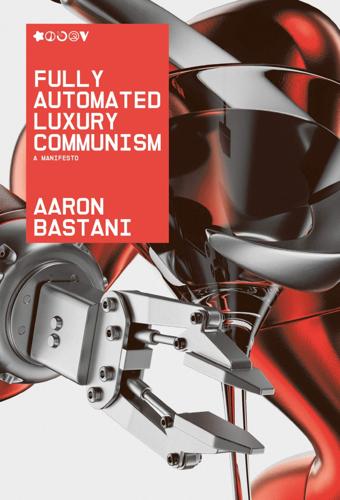
Fully Automated Luxury Communism
by
Aaron Bastani
Published 10 Jun 2019
Yet it is they who, for too long, unwisely echoed the claim that ‘small is beautiful’ and that the only way to save our planet was to retreat from modernity itself. FALC rallies against that command, distinguishing consumption under fossil capitalism – with its commuting, ubiquitous advertising, bullshit jobs and built-in obsolescence – from pursuing the good life under conditions of extreme supply. Under FALC we will see more of the world than ever before, eat varieties of food we have never heard of, and lead lives equivalent – if we so wish – to those of today’s billionaires. Luxury will pervade everything as society based on waged work becomes as much a relic of history as the feudal peasant and medieval knight.

The New Nomads: How the Migration Revolution Is Making the World a Better Place
by
Felix Marquardt
Published 7 Jul 2021
The Glass Ceiling: Why It Pays To Be Privileged. Policy Press (2019). Furet, F. The Passing of an Illusion: The Idea of Communism in the Twentieth Century. Translated by Deborah Furet. University of Chicago Press (1999). Gogol, N. V. Revizor (The Government Inspector). Translated by William Harrison. Blackwell (1984). Graeber, D. Bullshit Jobs: A Theory. Penguin (2018). Graeber, D. Debt: The First 5000 Years. Melville House (2012). Graeber, D. The Utopia of Rules: On Technology, Stupidity, and the Joys of Bureaucracy. Melville House (2016). Gramsci, A. Prison Notebooks. Lawrence and Wishart (1973). Gros, F. A Philosophy of Walking.
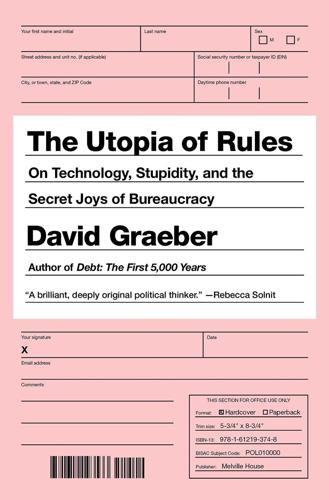
Bureaucracy
by
David Graeber
Published 3 Feb 2015
At the same time, some of the profits from rent extraction are recycled to select portions of the professional classes, or to create new cadres of paper-pushing corporate bureaucrats. This helps a phenomenon I have written about elsewhere: the continual growth, in recent decades, of apparently meaningless, make-work, “bullshit jobs”—strategic vision coordinators, human resources consultants, legal analysts, and the like—despite the fact that even those who hold such positions are half the time secretly convinced they contribute nothing to the enterprise. In the end, this is just an extension of the basic logic of class realignment that began in the seventies and eighties as corporate bureaucracies become extensions of the financial system.
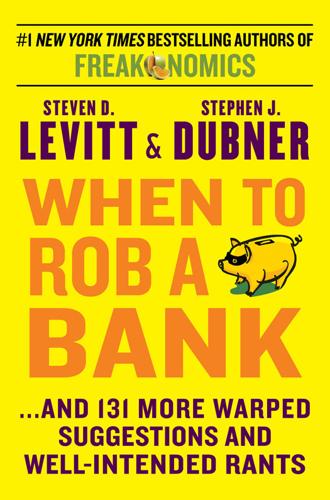
When to Rob a Bank: ...And 131 More Warped Suggestions and Well-Intended Rants
by
Steven D. Levitt
and
Stephen J. Dubner
Published 4 May 2015
The success of that book apparently inspired some other authors: The golfer John Daly has an autobiography out this week entitled My Life in and out of the Rough: The Truth About all the Bullshit You Think You Know About Me. This book is published by HarperCollins, the same people who published Freakonomics. They were scared to death of the title “Freakonomics” when my sister Linda Jines first thought it up. I guess they have loosened up a bit. Then there is 100 Bullshit Jobs . . . And How to Get Them by Stanley Bing. This book was also released just this week. Guess who the publisher was? HarperCollins! Then there was The Dictionary of Bullshit, published two weeks ago. At least that one wasn’t HarperCollins. Be careful not to confuse The Dictionary of Bullshit with The Dictionary of Corporate Bullshit, published in February.
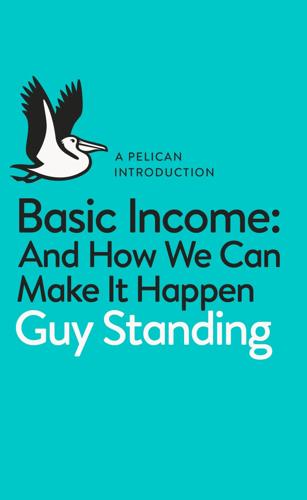
A Pelican Introduction: Basic Income
by
Guy Standing
Published 3 May 2017
Shifting to ‘reproductive’ work such as caring for relatives or work in the community could be expected to have beneficial environmental effects, because it would mean a shift to resource-conserving activities away from resource-depleting ones. Shorter working hours in jobs are correlated with smaller ecological footprints.33 And basic income would allow people to reject or spend less time on what David Graeber calls ‘bullshit’ jobs that they find hateful or meaningless.34 As mentioned in Chapter 2, basic income would also make it easier for governments to impose carbon taxes and other environmental measures designed to curb pollution and mitigate climate change, by compensating people for the extra costs of the goods and services affected or for livelihoods lost or disrupted.

Radicalized
by
Cory Doctorow
Published 19 Mar 2019
The cops had served no-knock warrants on all four, gone in with guns drawn and SWAT backup—but had somehow managed to fail to shoot any of them in the process. Joe took some comfort in that. Social media exploded with the personal lives of these four guys, who were, to put it mildly, basic as fuck. They had bullshit jobs: jobs that no one, not even them, thought worth doing. One was a management consultant. One was a customer service manager for a call center. One was an ad-tech programmer. One was a marketing specialist for cryptocurrency startups. All shared one trait: they’d watched the slow death of an insured loved one who’d been denied coverage.
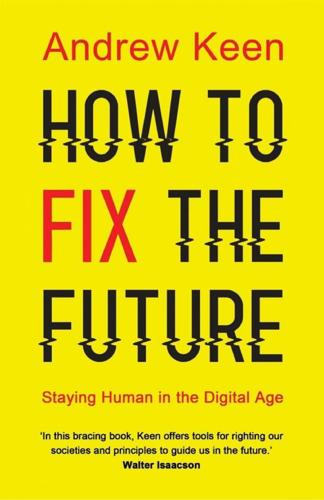
How to Fix the Future: Staying Human in the Digital Age
by
Andrew Keen
Published 1 Mar 2018
As we sit in a café outside Amsterdam Central Station on an unseasonably warm April afternoon, the youthful Bregman lays out the case for a universal basic income. Reiterating the core message in his book, that we need, in his words, to “control the future,” Bregman—like Daniel Straub—celebrates the disappearance of what he calls “bullshit jobs” that dumb us down and drain us of our humanity. Above all, however, Bregman argues that we live in radically disruptive times that require what he calls “big ideas” if we are to successfully reinvent the industrial welfare system of benefits. The old left, in particular, he tells me, is intellectually bankrupt, which may explain why many traditional socialists, particularly in the labor unions, haven’t embraced the universal basic income idea.
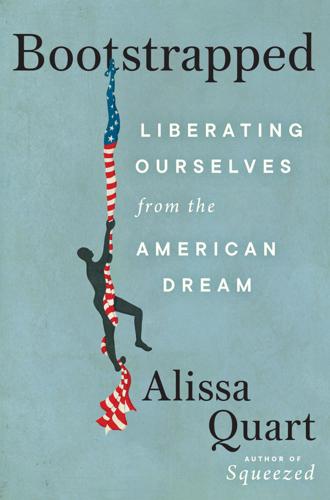
Bootstrapped: Liberating Ourselves From the American Dream
by
Alissa Quart
Published 14 Mar 2023
Yet I tend to imagine that this to-be era will be a little bit rosier than all that. In 2050, I wager, the dystopian social safety net might be like a relic from the Dark Ages, with far fewer basic health needs answered by a grim crowdfunding platform or whatever we will call such vehicles in the future. I also imagine far less commuting to bullshit jobs or exhausting work-related travel. There might be more strolls around local ponds, more charades with your kids, and more focused work, undiluted by advantage-seeking lunches and jostling happy hours with detached, beery colleagues. What must happen to arrive at this state, though, goes beyond the beloved broad-based movements and familiar narratives.
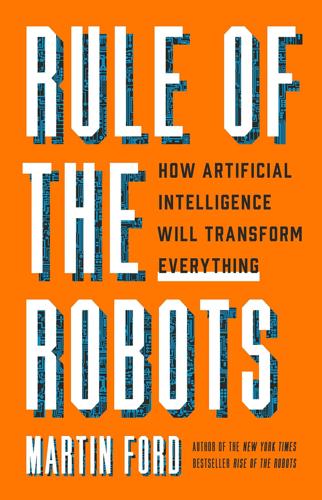
Rule of the Robots: How Artificial Intelligence Will Transform Everything
by
Martin Ford
Published 13 Sep 2021
Ultimately, the government would either have to fire those who underperformed or broke the rules—which would exclude any impacted individuals from the safety net—or the jobs program would effectively become the equivalent of a very expensive and inefficient basic income scheme. A large fraction of the positions created would in all likelihood be “bullshit jobs,” and unlike a basic income program, a jobs guarantee would directly attract workers away from more productive positions in the private sector. In contrast, a basic income requires little in the way of a bureaucracy and would take advantage of the government’s existing competence at sending out checks via programs like Social Security.

Amateurs!: How We Built Internet Culture and Why It Matters
by
Joanna Walsh
Published 22 Sep 2025
There is nothing virtual about the virtual. LOLcats are not so much an expression of the refusal of work as a desire to be at work, but at a leisurely pace, uncommitted, painfully pleasurable. LOLcats are not a violent revolution but a go-slow or, in its more contemporary iterations: quiet quitting, bullshit jobs, lazy-girl careers, #fails. Cheezburger’s para-site, Fail Blog, expanded from photos of #fails (verb becomes noun) to whole narratives.34 Most of these 48narratives are not about the failure of the poster, but their revenge against a system that has failed them. In fact, it’s a success blog. Popular stories regularly include the exposure of cheats (financial or amorous) or achievement against the odds – in the face of bad teachers, bad customers, bad bosses.

The Education of Millionaires: It's Not What You Think and It's Not Too Late
by
Michael Ellsberg
Published 15 Jan 2011
I asked him if he thought of himself as some kind of romantic rebel at this time. “No, that would glamorize it. I was really just a kid who was lost, who didn’t have any hope. I’m going to party as hard as I can, and maybe I’ll end up some old biker dude or something. I did not want to live, if I had to live in what I called ‘the cage,’ which was a nine-to-five bullshit job.” After dropping out and moving out, he got a job as a Pizza Hut delivery guy, then various food prep and dishwashing jobs, then a job installing electric underground dog fences, all the while playing in his band. (It’s interesting how people who opt out of “bullshit” corporate jobs usually instead end up in even more “bullshit” service jobs, if they don’t possess the type of entrepreneurial skills and mind-sets we’re learning in this book.

Rolling Nowhere
by
Ted Conover
Published 14 Jun 1984
Maybe I’d be able to stick with Bill and Forrest for a while, anyway. Forrest and I reconvened on the bench. We showed each other our cards and smiled. “What’d you tell ’em?” I asked Forrest. “Oil fields,” said Forrest. “I’m oil field trash. How ’bout you?” “Cattle. I’m a ranchhand from way back.” “Man,” said Forrest wryly, “this is all bullshit. ‘Job Service,’ my ass.” Forrest’s view was that the system was set up less to serve employees than employers. He recalled a session with one unemployment counselor who asked him a barrage of questions he felt had nothing to do with his qualifications for a particular job— “personal-type” questions.

My Life as a Goddess: A Memoir Through (Un)Popular Culture
by
Guy Branum
Published 29 Jul 2018
The successful acquisition of two jobs and the ensuing ten months of job-having had sort of taught me I was capable of survival. But more than that, doing stand-up meant I was happy, and despite my cynical thoughts to the contrary, part of me was certain that following what made me happy would be the right path. I got a semi-bullshit job selling high-end tech solutions over the phone. It was basically tech-boom telemarketing. It didn’t matter. I had decided to stop worrying about what my career and path were and focus on making a life that seemed rewarding. Plus there were two sassy ladies who worked there who liked to get chips ’n’ margs after work.

The Government of No One: The Theory and Practice of Anarchism
by
Ruth Kinna
Published 31 Jul 2019
Prisons and Policing Peter Kropotkin, In French and Russian Prisons (Montreal: Black Rose, 1991) Kristian Williams, Our Enemies in Blue (Oakland and Edinburgh: AK Press, 2015) Work CrimethInc., Work: Capitalism. Economics. Resistance (Salem, OR: CrimethInc. ex-Workers’ Collective, n.d.) David Graeber, ‘On the Phenomenon of Bullshit Jobs’, Strike! 3 (Summer 2013) Housing Squatting Europe Kollective, The Squatters’ Movement in Europe: Commons and Autonomy as Alternatives to Capitalism, ed. Claudio Cattanco and Miguel A. Martínez (London: Pluto, 2014) Colin Ward, Housing: An Anarchist Approach (London: Freedom Press, 1976), online at https://libcom.org/library/colin-ward-housing-anarchist-approach Colin Ward, Cotters and Squatters (Nottingham: Five Leaves, 2002) Movements Chris Dixon, Another Politics: Talking Across Today’s Transformative Movements (Berkeley: University of California Press, 2014) Laura Portwood-Stacer, Lifestyle Politics and Radical Activism (London and New York: Bloomsbury, 2013) Richard J.

The Premonition: A Pandemic Story
by
Michael Lewis
Published 3 May 2021
The official newly in charge of him, Heidi Avery, who came from some deep place in the intelligence community and was now called deputy assistant to the president for homeland security, told him that the Obama administration had decided to dissolve the Biodefense Directorate and fold it into something called the Resilience Directorate. For Carter personally, it just meant swapping out one bullshit job title he could barely remember for another. In terms of pandemic response more generally, he thought it was a big mistake: henceforth disease would be managed alongside all the other existential threats to American life, and, along with other, less sexy threats, be shoved into the background. George Bush’s moment of terror after reading John Barry’s book had led his administration to break with tradition and create an office that did nothing but worry about pandemics.
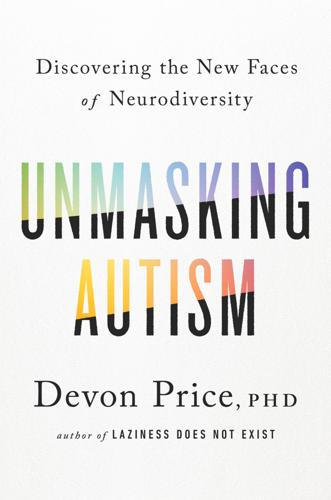
Unmasking Autism: Discovering the New Faces of Neurodiversity
by
Devon Price
Published 4 Apr 2022
Undiagnosed Autistics are not able to apply for disability, and recipients must have their eligibility reevaluated on a regular basis (between every six to eighteen months).[28] Processing and investigating disability benefit cases is incredibly costly. It is for this reason that writer and anthropologist David Graeber suggested in the book Bullshit Jobs that it would be far less expensive and far more socially just to simply provide a baseline, universal basic income to all people, with no strings attached. While replacing all social welfare programs with universal basic income is probably not a wise move, based on the available data,[29] a less restrictive, more generous approach to providing disability benefits would clearly improve disabled people’s quality of life.
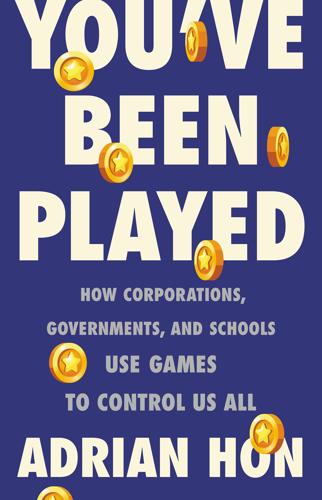
You've Been Played: How Corporations, Governments, and Schools Use Games to Control Us All
by
Adrian Hon
Published 14 Sep 2022
People do all sorts of hard and frustrating and even unpaid and unpleasant things that aren’t fun, like tending to the dying or managing a classroom of unruly children or writing a book about gamification. They do these things for lots of reasons. Because it’s satisfying. Because it’s their calling. Because it lets them express themselves. Not because it’s fun. As David Graeber wrote in Bullshit Jobs, “The need to play a game of make-believe not of one’s own making, a game that exists only as a form of power imposed on you, is inherently demoralizing.” It is cruel to coerce workers into a funhouse distortion of play. Fairly paid, meaningful work can be its own reward. Absent that, workplace gamification is like pouring acid onto a festering wound.

Exponential: How Accelerating Technology Is Leaving Us Behind and What to Do About It
by
Azeem Azhar
Published 6 Sep 2021
Moravec, Mind Children: The Future of Robot and Human Intelligence (Cambridge, MA: Harvard University Press, 1988), p. 15. 23 ‘Liquidity, Volatility, Fragility’, Goldman Sachs Global Macro Research, 68, June 2018. 24 John Gittelson, ‘End of Era: Passive Equity Funds Surpass Active in Epic Shift’, Bloomberg, 11 September 2019 <https://www.bloomberg.com/news/articles/2019-09-11/passive-u-s-equity-funds-eclipse-active-in-epic-industry-shift> [accessed 14 October 2020]. 25 ‘March of the Machines – The Stockmarket Is Now Run by Computers, Algorithms and Passive Managers’, The Economist, 5 October 2019 <https://www.economist.com/briefing/2019/10/05/the-stockmarket-is-now-run-by-computers-algorithms-and-passive-managers> [accessed 14 October 2020]. 26 Michael Polanyi and Amartya Sen, The Tacit Dimension (Chicago, IL: University of Chicago Press, 2009), p. 4. 27 David Graeber, Bullshit Jobs: A Theory (New York: Simon & Schuster, 2018), p. 236 28 Carl Benedikt Frey, The Technology Trap: Capital, Labor, and Power in the Age of Automation (Princeton, NJ: Princeton University Press, 2019), p. 311. 29 Staci D. Kramer, ‘The Biggest Thing Amazon Got Right: The Platform’, Gigaom, 12 October 2011 <https://gigaom.com/2011/10/12/419-the-biggest-thing-amazon-got-right-the-platform/> [accessed 18 September 2020]. 30 The approach has become de rigueur among other digital cognoscenti, but Bezos’s email should surely be considered as one of the single most important internal communications of all time. 31 Chris Johnston, ‘Amazon Opens a Supermarket with No Checkouts’, BBC News, 22 January 2018 <https://www.bbc.com/news/business-42769096> [accessed 18 September 2020]. 32 Peter Holley, ‘Amazon’s One-Day Delivery Service Depends on the Work of Thousands of Robots’, Washington Post, 7 June 2019 <https://www.washingtonpost.com/technology/2019/06/07/amazons-one-day-delivery-service-depends-work-thousands-robots/> [accessed 18 September 2020]. 33 Harry Dempsey, ‘Amazon to Hire Further 100,000 Workers in US and Canada’, 14 September 2020 <https://www.ft.com/content/9817aae3-1e89-4383-aa34-742447d5794a> [accessed 18 September 2020]. 34 ‘Netflix Continues to Hire Through the Pandemic, Says Co-CEO Reed Hastings’, Bloomberg, 9 September 2020 <https://www.bloomberg.com/news/videos/2020-09-09/netflix-continues-to-hire-through-the-pandemic-video> [accessed 18 September 2020]. 35 ‘Netflix: Number of Employees 2006-2020’, Macro Trends <https://www.macrotrends.net/stocks/charts/NFLX/netflix/number-of-employees> [accessed 27 March 2021]. 36 Vishnu Rajamanickm, ‘JD.Com Opens Automated Warehouse That Employs Four People but Fulfills 200,000 Packages Daily’, FreightWaves, 25 June 2018 <https://www.freightwaves.com/news/technology/jdcom-opens-automated-warehouse-that-employs-four-people-but-fulfills-200000-packages-daily> [accessed 27 March 2021]. 37 Reuters Staff, ‘Dish to Close 300 Blockbuster Stores, 3,000 Jobs May Be Lost’, Reuters, 23 January 2013 <https://www.reuters.com/article/us-blockbuster-storeclosings-idUSBRE90M05I20130123> [accessed 7 January 2021]. 38 Daron Acemoglu, Claire LeLarge and Pascual Restrepo, Competing with Robots: Firm-Level Evidence from France, Working Paper Series (National Bureau of Economic Research, February 2020) <https://doi.org/10.3386/w26738>. 39 Daron Acemoglu and Pascual Restrepo, Robots and Jobs: Evidence from US Labor Markets, Working Paper Series (National Bureau of Economic Research, March 2017) <https://doi.org/10.3386/w23285>. 40 David Klenert, Enrique Fernández-Macías and José-Ignacio Antón, ‘Don’t Blame It on the Machines: Robots and Employment in Europe’, VoxEU, 24 February 2020 <https://voxeu.org/article/dont-blame-it-machines-robots-and-employment-europe> [accessed 10 September 2020]. 41 Till Leopold et al., The Future of Jobs 2018, World Economic Forum <https://wef.ch/2NH6NiV> [accessed 25 September 2020]. 42 Leslie Willcocks, ‘Robo-Apocalypse Cancelled?

Human Frontiers: The Future of Big Ideas in an Age of Small Thinking
by
Michael Bhaskar
Published 2 Nov 2021
Standard of Living Since the Civil War, Princeton, NJ: Princeton University Press Gould, Stephen Jay (2007), Punctuated Equilibrium, Cambridge, MA: The Belknap Press of Harvard University Press Graeber, Charles (2018), The Breakthrough: Immunotherapy and the Race to Cure Cancer, London: Scribe Graeber, David (2016), The Utopia of Rules: On Technology, Stupidity, and the Secret Joys of Bureaucracy, New York: Melville House Graeber, David (2018), Bullshit Jobs: A Theory, London: Allen Lane Grant, Adam (2016), Originals: How Non-Conformists Move the World, New York: Viking Grayling, A.C. (2021), The Frontiers of Knowledge: What We Know About Science, History and The Mind – And How We Know It, London: Viking Greenspan, Alan, and Adrian Wooldridge (2018), Capitalism in America: A History, London: Allen Lane Greif, Avner, Kiesling, Lynne, and Nye, John V.C.
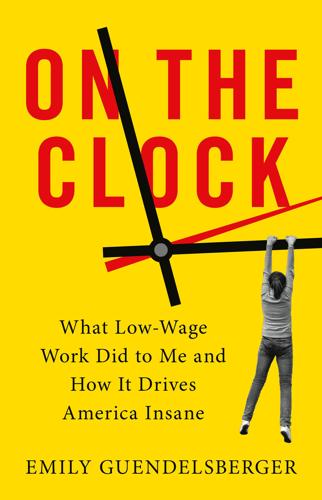
On the Clock: What Low-Wage Work Did to Me and How It Drives America Insane
by
Emily Guendelsberger
Published 15 Jul 2019
“Something about the fish rotting in there gets into your lungs, and it made us all sick. Not to mention the sleep deprivation—we were working sixteen hours a day.” “Jesus,” I say. “So Amazon is… kind of cake, then?” The guys jump all over each other in their eagerness to communicate what an easy, bullshit job picking is. “So was Naknek the worst job you’ve ever had?” “No,” says Matthias, a serious guy with dirty-blond dreads. “Without a fucking doubt,” says Zeb. “This was the first real job I’ve had,” says Probably Teenage Neal. “I thought being in a call center was worse, psychologically,” says Damien, the bearded, soft-spoken guy to my right, passing me the bottle of whiskey.

Generation Kill
by
Evan Wright
Published 19 May 2004
But the battalion had other plans. When the invasion began, Swarr and two other Marines from First Recon were ordered to remain behind at the Al Jabar airfield in Kuwait to serve as liaisons to the Marine Corps Air Wing. Within a few days, he and his two comrades figured out their assignment was a bullshit job. “They didn’t give a fuck about us at Jabar,” Gunny Swarr says. “There was nothing to do.” They pulled some strings, got permission to leave and hitchhiked up to Camp Mathilda with some Pakistani laborers. The battalion had already left for the invasion, but Swarr and his cohorts found out there was a company of reservist Recon Marines still in the camp, who were getting ready to enter Iraq and link up with the battalion in a few days.
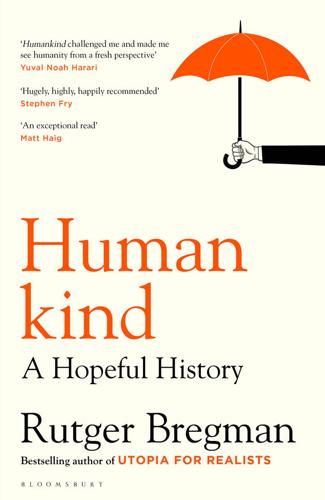
Humankind: A Hopeful History
by
Rutger Bregman
Published 1 Jun 2020
Educationalists agree that Hogwarts is a recipe for a bullying culture. 36Don’t get me wrong, there are basic skills, like reading and writing, that people living in modern society can’t do without. And there are kids with less aptitude to learn these skills. In such cases, expert instruction by a trained teacher is essential. 37Robert Dur and Max van Lent, ‘Socially Useless Jobs’, Tinbergen Institute Discussion Paper (2 May 2018). 38David Graeber, ‘On the Phenomenon of Bullshit Jobs: A Work Rant’, Strike! Magazine (August 2013). 39Ivan Illich, Deschooling Society (New York, 1971). 40Peter Gray, Free to Learn. Why Unleashing the Instinct to Play Will Make Our Children Happier, More Self-Reliant, and Better Students for Life (New York, 2013). 41Quoted in Lois Holzman, ‘What’s the Opposite of Play?’

Imaginable: How to See the Future Coming and Feel Ready for Anything―Even Things That Seem Impossible Today
by
Jane McGonigal
Published 22 Mar 2022
Every course would look at a different angle of the problem—historical, economic, scientific, political, cultural—or explore possible solution spaces or interventions—technological, social, financial, behavioral. No one would worry that their major was “irrelevant” or that they would wind up in a “bullshit” job. It’s all hands on deck for things that really matter. I got goose bumps when I heard this concept. I suddenly wanted to wake up in that future tomorrow. I asked the participant who contributed this idea to tell me more. It turns out that she’d been part of a project by design students and faculty at Stanford University to imagine how learning might change between the years 2025 and 2100, and this was one of the top five futures they’d come up with.5 She loved the idea as much as I did.
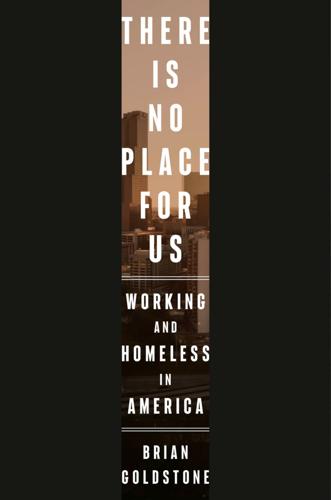
There Is No Place for Us: Working and Homeless in America
by
Brian Goldstone
Published 25 Mar 2025
In part, this was because her stimulus checks and tax refund had given her a bit of a cushion, even after contributing to Aaliyah’s rent and utility payments. But the main reason, she told a friend, was that she had arrived at the point in her life where she was simply tired of working “underpaid bullshit jobs,” as she put it. “More than half of my life is over,” she said. “Is this really how I want to spend the rest of my days, cleaning toilets at Hartsfield-Jackson?” Now that she was no longer struggling to put food on the table for her family, she was resolved that the final chapter of her life would involve doing something she found fulfilling.

Leviathan Wakes
by
James S. A. Corey
Published 14 Jun 2011
“Sure, what the hell,” he said. “It’s not like I would have shipped her back home if I’d found her.” “No?” Miller shifted his hands in a gesture that meant Of course not. “She’s a good kid,” Miller said. “How would you feel if you were all grown up and Mommy could still pull you back home by your ear? It was a bullshit job from the start.” Dawes smiled again. This time it actually did help a little. “I’m glad to hear you say that, Detective. And I won’t forget the rest of our agreement. When we find her, I will tell you. You’ve got my word on it.” “I appreciate that,” Miller said. There was a moment of silence.
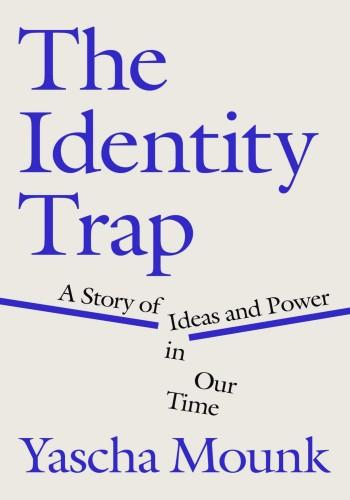
The Identity Trap: A Story of Ideas and Power in Our Time
by
Yascha Mounk
Published 26 Sep 2023
GO TO NOTE REFERENCE IN TEXT likely to learn: As of a 2015 survey, 76 percent of colleges reported using distribution requirements requiring students to take a breadth of classes outside their major. Scott Jaschik, “Distribution Plus,” Inside Higher Ed, Jan. 19, 2016, www.insidehighered.com/news/2016/01/19/survey-colleges-finds-distribution-requirements-remain-popular-new-features. GO TO NOTE REFERENCE IN TEXT failed to keep pace: Michael Delucchi et al., “What’s That Smell? Bullshit Jobs in Higher Education,” Review of Social Economy, June 17, 2021, 1–22, doi.org/10.1080/00346764.2021.1940255. GO TO NOTE REFERENCE IN TEXT nonteaching staff skyrocketed: Delucchi et al., “What’s That Smell?,” 3. GO TO NOTE REFERENCE IN TEXT once comfortably outnumbered: In 2018, there were 832,119 professors and 1,086,070 administrators and other professional staff, while in 1976 they numbered 434,000 and 247,322, respectively.

Hunger: The Oldest Problem
by
Martin Caparros
Published 14 Jan 2020
August 2003. p. 2. 11 Footnoted in: Breman, Jay. The Labouring Poor In India. Oxford: Oxford University Press, 2003. p 13 12 Footnoted in: Central Intelligence Agency. The World FactBook. Washington D.C., 2002. p. 80. 13 Davis, Mike. Planet of Slums. London: Verso Books, 2006. p. 18. 14 Graeber, David. “On the Phenomenon of Bullshit Jobs: A Work Rant.” Strike! Magazine no. 3. August 2013. ON HUNGER: CHARITY 1 McNamara, Robert S. “Address to the Board of Governors.” Speech. World Bank Group, Nairobi, Kenya, September 24, 1973. 2 Eagleton, Terry. Why Marx Was Right. New Haven: Yale University Press, 2011, p. 68. 3 “ANTI-HUNGER PROGRAMME: A twin-track approach to hunger reduction: priorities for national and international action.”

Steve Jobs
by
Walter Isaacson
Published 23 Oct 2011
Make no mistake. They want to kill the iPhone. We won’t let them.” A few minutes later, after the meeting moved on to another topic, Jobs returned to his tirade to attack Google’s famous values slogan. “I want to go back to that other question first and say one more thing. This ‘Don’t be evil’ mantra, it’s bullshit.” Jobs felt personally betrayed. Google’s CEO Eric Schmidt had been on the Apple board during the development of the iPhone and iPad, and Google’s founders, Larry Page and Sergey Brin, had treated him as a mentor. He felt ripped off. Android’s touchscreen interface was adopting more and more of the features—multi-touch, swiping, a grid of app icons—that Apple had created.
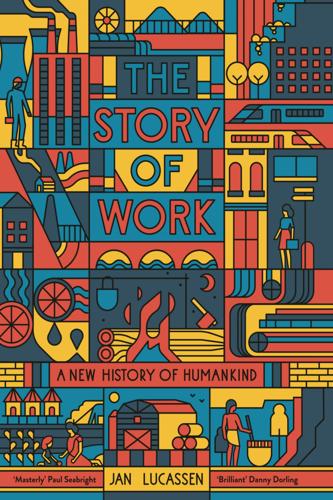
The Story of Work: A New History of Humankind
by
Jan Lucassen
Published 26 Jul 2021
‘Serfs on the Move: Peasant Seasonal Migration in Pre-Reform Russia, 1800–61’, Kritika: Explorations in Russian and Eurasian History, 1(4) (Fall 2000, New Series), pp. 627–56. Goyal, S.R. The Coinage of Ancient India (Jodhpur: Kusumanjali, 1995). Goyal, Shankar. Ancient Indian Numismatics: A Historiographical Study (Jodhpur: Kusumanjali, 1998). Graeber, David. Bullshit Jobs: A Theory (London: Penguin, 2019). Graham, Laurel D. ‘Domesticating Efficiency: Lillian Gilbreth’s Scientific Management of Homemakers, 1924–1930’, Signs: Journal of Women in Culture and Society, 24(3) (1999), pp. 633–75. Green, Toby. A Fistful of Shells: West Africa from the Rise of the Slave Trade to the Age of Revolution (Chicago: University of Chicago Press, 2019).

The Dawn of Everything: A New History of Humanity
by
David Graeber
and
David Wengrow
Published 18 Oct 2021
BY THE SAME AUTHORS David Graeber: Toward an Anthropological Theory of Value: The False Coin of Our Own Dreams Fragments of an Anarchist Anthropology Lost People: Magic and the Legacy of Slavery in Madagascar Direct Action: An Ethnography Debt: The First 5,000 Years The Democracy Project: A History, a Crisis, a Movement The Utopia of Rules: On Technology, Stupidity, and the Secret Joys of Bureaucracy Bullshit Jobs: A Theory David Wengrow: The Archaeology of Early Egypt: Social Transformations in North-East Africa, 10,000 to 2650 bc What Makes Civilization? The Ancient Near East and the Future of the West The Origins of Monsters: Image and Cognition in the First Age of Mechanical Reproduction Copyright © 2021 by David Graeber and David Wengrow Signal and colophon are registered trademarks of Penguin Random House Canada Limited.